Thermal Energy Transfer
Mastering Modern Heat Pump System Innovations

We have perfected modern innovations in heat pump systems. Our expertise will lead you through the development of heat pump technology, assisting you in comprehending the efficiency and performance of these systems.
We’ll explore advanced compressor technology, innovations in refrigerants, and the benefits of variable speed heat pump systems.
Our smart controls and energy management solutions will optimize your heat pump’s performance while integrating seamlessly with renewable energy sources.
Get ready to master the world of heat pumps with us.

Key Takeaways
- Evolution of heat pump technology driven by efficiency and environmental-friendliness
- Importance of considering COP and HSPF in understanding heat pump efficiency and performance
- Advanced compressor technology enhances efficiency, reliability, and durability
- Innovations in heat pump refrigerants contribute to reducing greenhouse gas emissions and protecting the ozone layer
The Evolution of Heat Pump Technology
We have witnessed significant advancements in heat pump technology over the years. The evolution of heat pump technology has been driven by the need for more efficient and environmentally-friendly solutions.
One of the key areas of improvement has been in the development of heat pump refrigerants. Traditional refrigerants, such as chlorofluorocarbons (CFCs), were found to have a detrimental impact on the ozone layer. As a result, new refrigerants, such as hydrochlorofluorocarbons (HCFCs) and hydrofluorocarbons (HFCs), were introduced that had lower ozone-depleting potential.
However, these refrigerants were still found to have a high global warming potential. In recent years, advancements in heat pump refrigerants have focused on the use of natural refrigerants, such as hydrocarbons and carbon dioxide, which have significantly lower global warming potential.
These advancements haven’t only improved the environmental impact of heat pumps but have also led to higher energy efficiency and better overall performance.
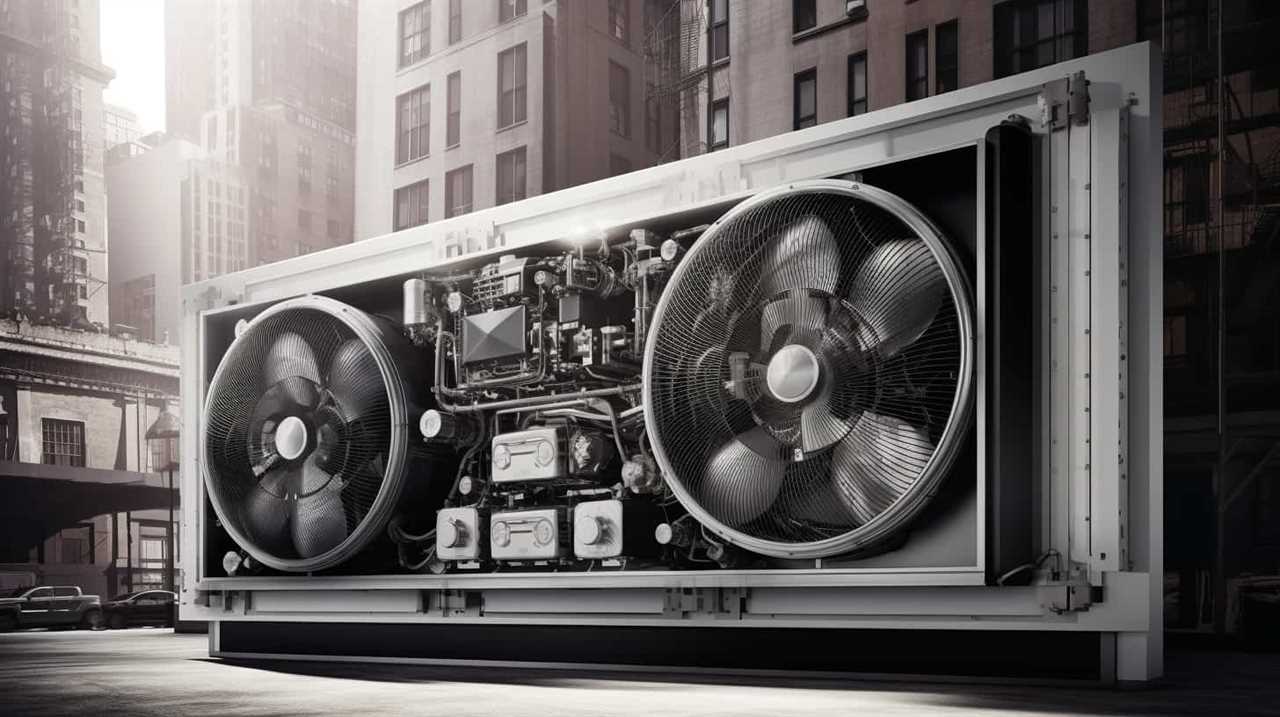
Understanding Heat Pump Efficiency and Performance
To fully comprehend the efficiency and performance of heat pumps, it’s essential to consider both the COP (Coefficient of Performance) and the HSPF (Heating Seasonal Performance Factor). These metrics are used to evaluate the effectiveness and energy efficiency of heat pumps.
The COP measures the ratio of heat output to electrical energy input, providing an indication of how efficiently the heat pump converts energy into heat. Meanwhile, the HSPF takes into account the COP along with factors such as defrost cycles and standby losses, giving a more comprehensive assessment of the heat pump’s performance over an entire heating season.
Both the COP and HSPF are important in determining if a heat pump meets the necessary efficiency standards. Understanding these heat pump performance metrics is crucial in selecting the most efficient and effective system for serving customers.
Now, let’s delve into the next section, which explores the advanced compressor technology in modern heat pumps.
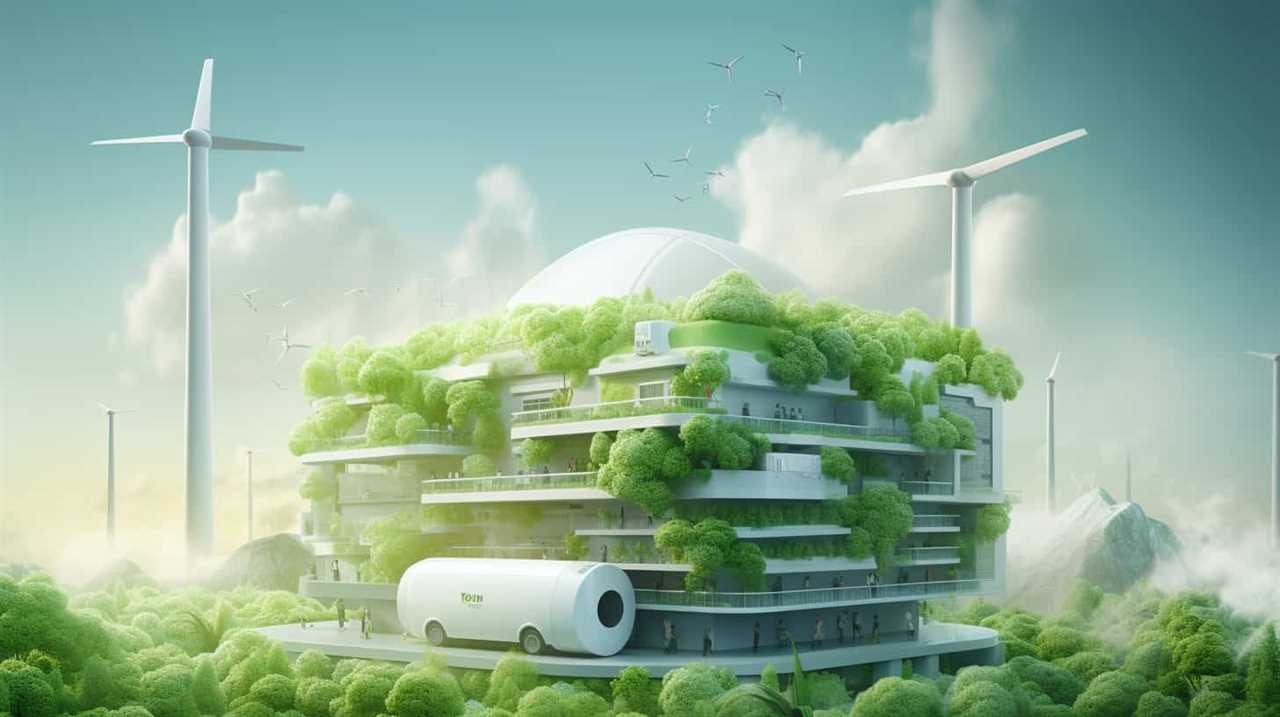
Advanced Compressor Technology in Modern Heat Pumps
But before we delve into advanced compressor technology in modern heat pumps, let’s first understand the importance of efficient and effective heat pump performance metrics. These metrics are crucial in evaluating the overall performance of a heat pump system and identifying areas for improvement.
Now, let’s explore the advancements in compressor technology that contribute to heat pump performance optimization:
-
Advanced compressor design: Modern heat pumps employ innovative compressor designs that enhance efficiency and reliability. These designs incorporate technologies such as variable speed compressors, which allow the system to adjust its capacity based on the heating or cooling demands of the space.
-
Enhanced efficiency: Advanced compressors utilize improved motor technologies and advanced control algorithms to optimize energy consumption and reduce operating costs.
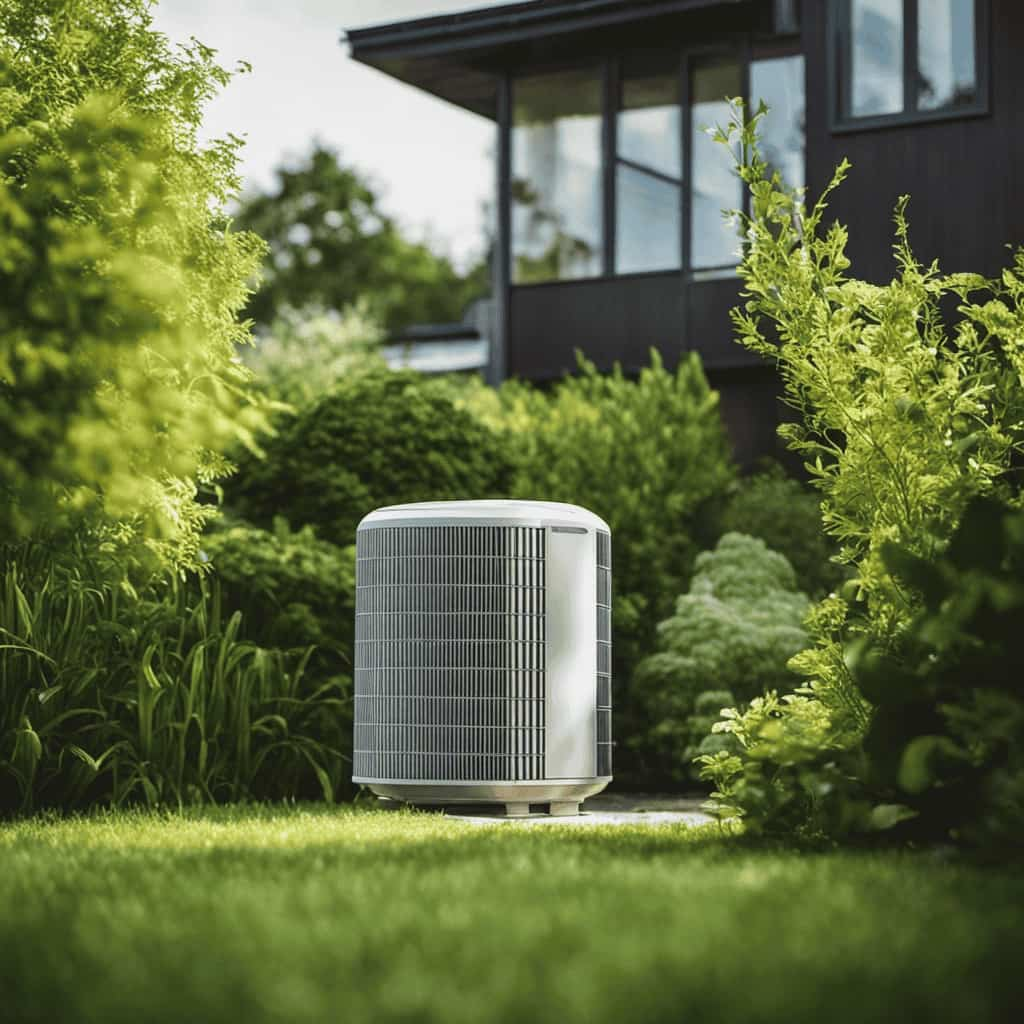
-
Improved durability: Heat pumps with advanced compressor technology are designed to withstand extreme conditions, ensuring long-lasting performance and minimal maintenance requirements.
-
Enhanced performance in low ambient temperatures: Advanced compressors are equipped with features that enable heat pumps to operate efficiently even in cold climates, providing reliable heating during winter months.
Innovations in Heat Pump Refrigerants
One of the key innovations in heat pump technology is the use of new refrigerants, which offer improved performance and environmental benefits. Heat pump refrigerant regulations have become increasingly stringent, prompting the development of sustainable heat pump refrigerants that have lower global warming potential (GWP) and ozone depletion potential (ODP) compared to traditional refrigerants. These new refrigerants are designed to minimize the impact on the environment while still providing efficient heating and cooling capabilities. Here is a table highlighting some of the sustainable heat pump refrigerants currently available:
| Refrigerant | GWP | ODP |
|---|---|---|
| R-32 | 675 | 0 |
| R-410A | 2088 | 0 |
| R-407C | 1774 | 0 |
| R-1234ze(E) | <1 | 0 |
| R-1234yf | <1 | 0 |
These refrigerants not only comply with regulations but also contribute to a greener future by reducing greenhouse gas emissions and protecting the ozone layer.

Exploring Variable Speed Heat Pump Systems
Exploring the capabilities of variable speed heat pump systems, we can maximize energy efficiency and optimize comfort levels in our homes. Variable speed technology allows heat pumps to adjust their operating speeds based on the heating or cooling demands of a space. This flexibility provides several energy-saving features that benefit both homeowners and the environment:
-
Enhanced Energy Efficiency: Variable speed heat pumps can operate at lower speeds for longer periods of time, reducing energy consumption and improving overall efficiency.
-
Precise Temperature Control: These systems can maintain a consistent temperature by making small adjustments to the heating or cooling output, resulting in improved comfort levels.
-
Quieter Operation: Variable speed technology allows heat pumps to operate at lower speeds, resulting in reduced noise levels compared to traditional systems.
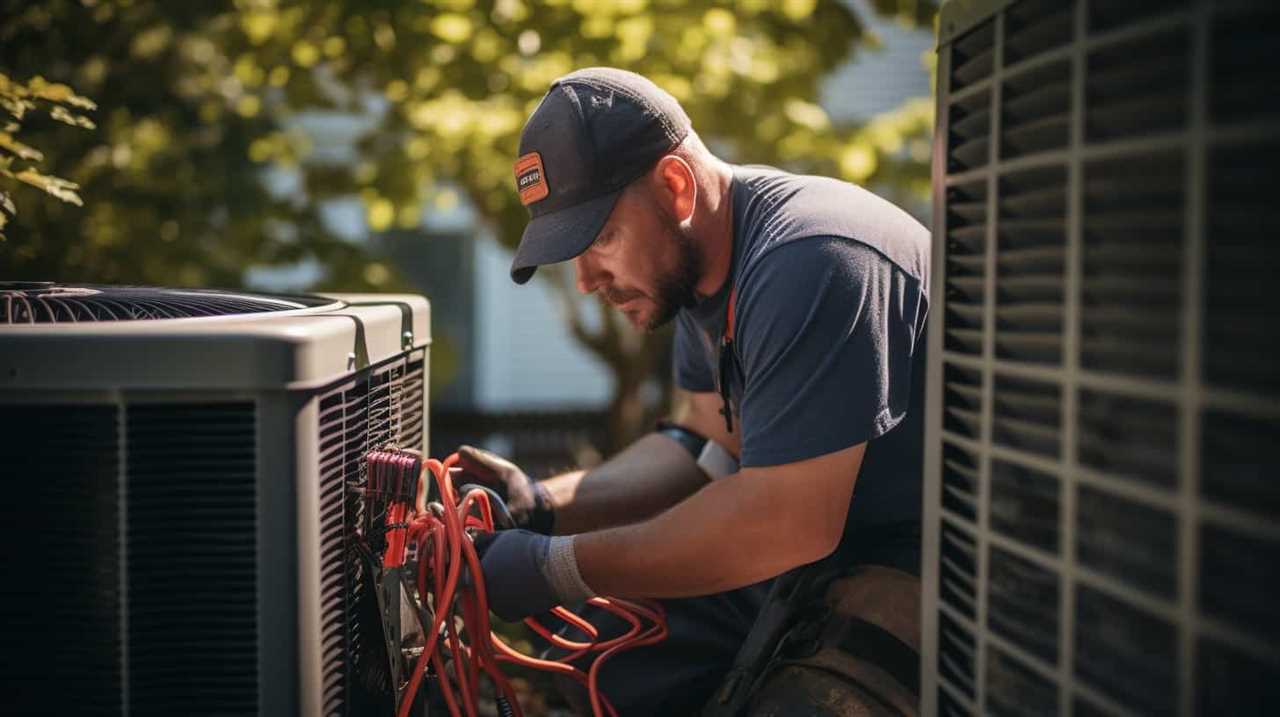
-
Extended Lifespan: The ability to operate at lower speeds reduces wear and tear on the system, leading to a longer lifespan and lower maintenance costs.
By incorporating variable speed heat pump systems into our homes, we can enjoy the benefits of increased energy efficiency and improved comfort levels while reducing our carbon footprint.
Moving forward, let’s explore the next section on enhancing heat transfer in modern heat pumps.
Enhancing Heat Transfer in Modern Heat Pumps
To optimize the performance of modern heat pumps, we can enhance heat transfer through various innovative techniques. Improving heat transfer efficiency is crucial for maximizing the effectiveness of heat pump systems.
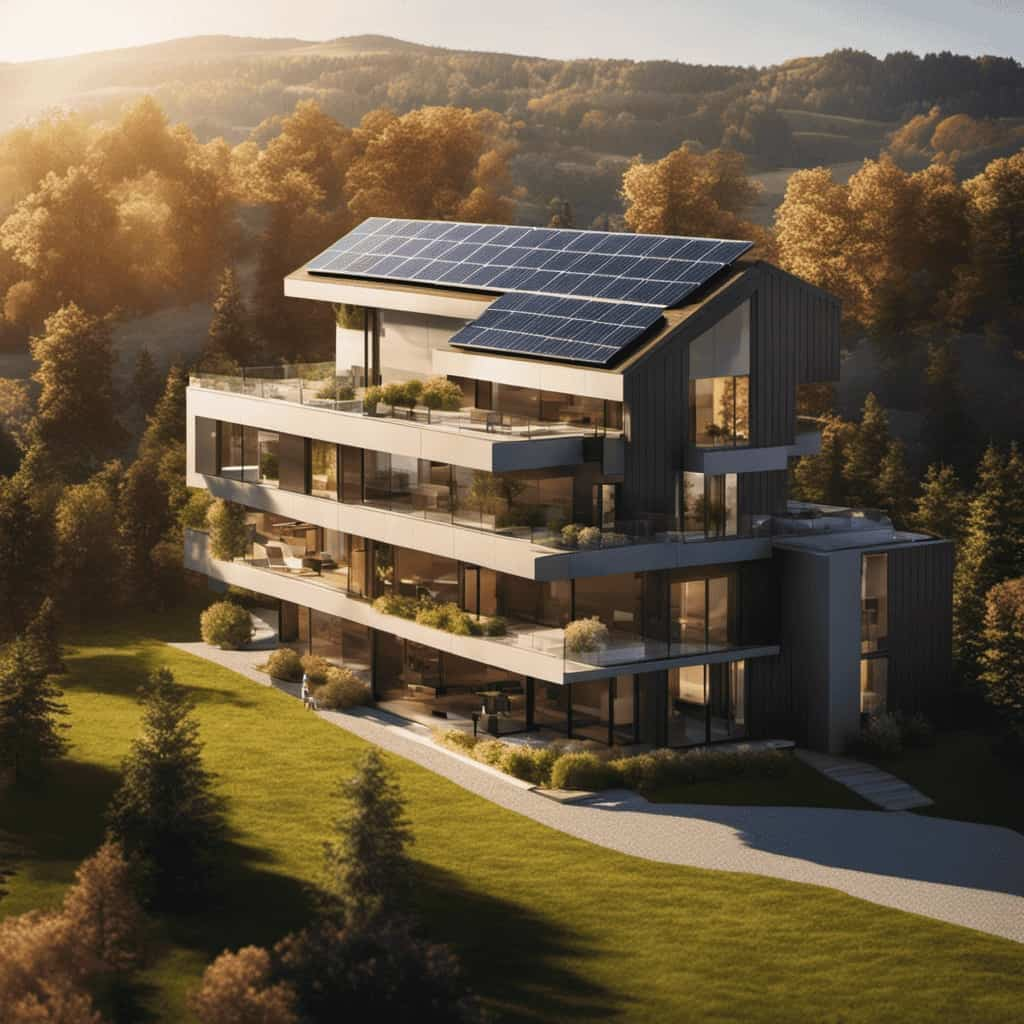
One way to achieve this is by implementing novel heat exchanger designs. Traditional heat exchangers have limitations in terms of heat transfer efficiency due to factors such as limited surface area and inefficient fluid flow patterns. However, recent advancements have led to the development of more efficient heat exchanger designs.
These designs incorporate features such as enhanced surface area, improved fluid flow paths, and optimized heat transfer surfaces. By utilizing these innovative heat exchanger designs, heat transfer efficiency can be significantly improved, resulting in better overall performance of modern heat pump systems.
Smart Controls and Energy Management in Heat Pump Systems
Smart controls and energy management systems are essential components of modern heat pump systems. These innovative features offer energy-saving benefits by optimizing the operation of the heat pump and ensuring efficient use of resources.
Improved temperature regulation allows for precise control and comfort, while remote monitoring capabilities enable users to monitor and adjust their heat pump systems from anywhere, maximizing convenience and control.

Energy-Saving Smart Controls
We are implementing energy-saving controls to improve the efficiency of heat pump systems. Smart thermostats are a key component of these controls, allowing for precise temperature control and energy management. By analyzing energy consumption patterns, smart thermostats can optimize the operation of the heat pump system, reducing energy waste and lowering utility costs.
Here are four key benefits of energy-saving smart controls:
-
Enhanced Comfort: Smart thermostats monitor and adjust temperature settings based on occupancy and user preferences, ensuring a comfortable living environment at all times.
-
Energy Efficiency: Through advanced algorithms and machine learning, smart controls optimize the heat pump system’s operation, reducing energy consumption and promoting sustainability.
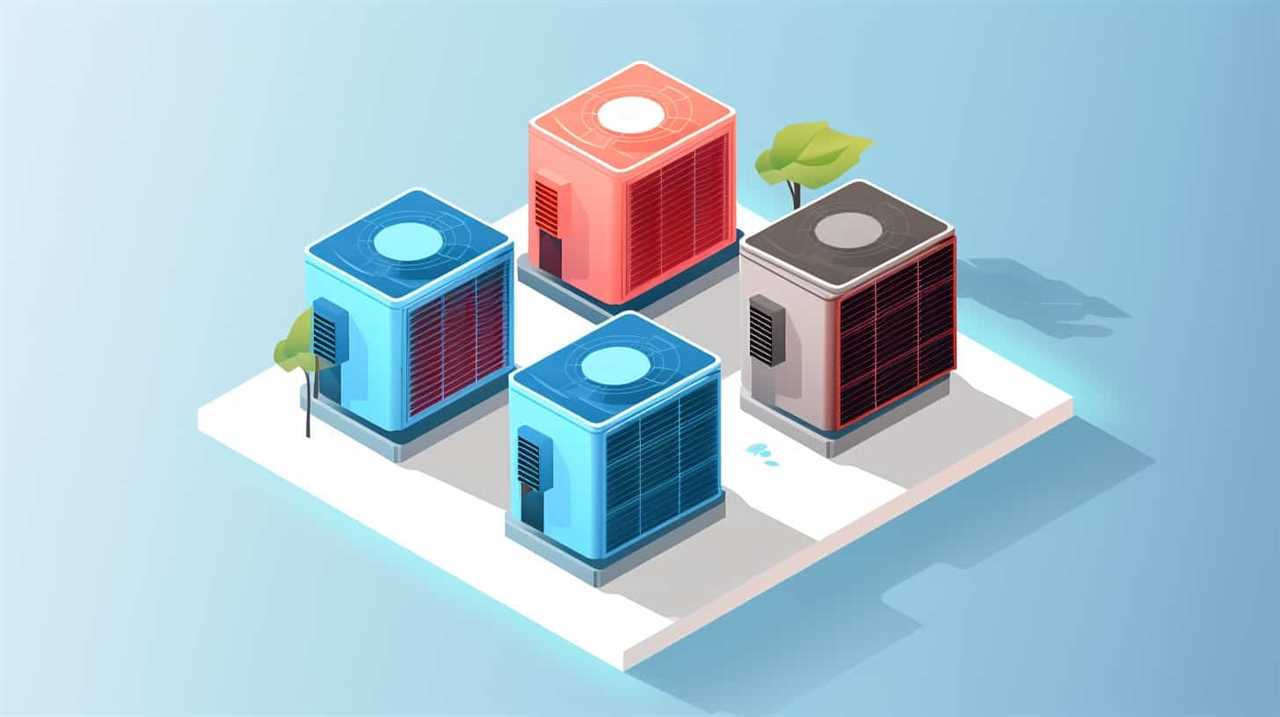
-
Cost Savings: By intelligently managing energy usage, smart controls can significantly lower utility bills, leading to long-term cost savings for homeowners.
-
Remote Access and Control: Smart controls allow users to manage and monitor their heat pump system remotely, providing convenience and flexibility.
With energy-saving smart controls in place, we can now explore the next section on improved temperature regulation.
Improved Temperature Regulation
Our goal is to achieve precise and efficient temperature regulation in heat pump systems through the use of advanced controls and energy management techniques. By implementing these innovations, we can greatly improve energy efficiency and promote sustainable heating solutions.
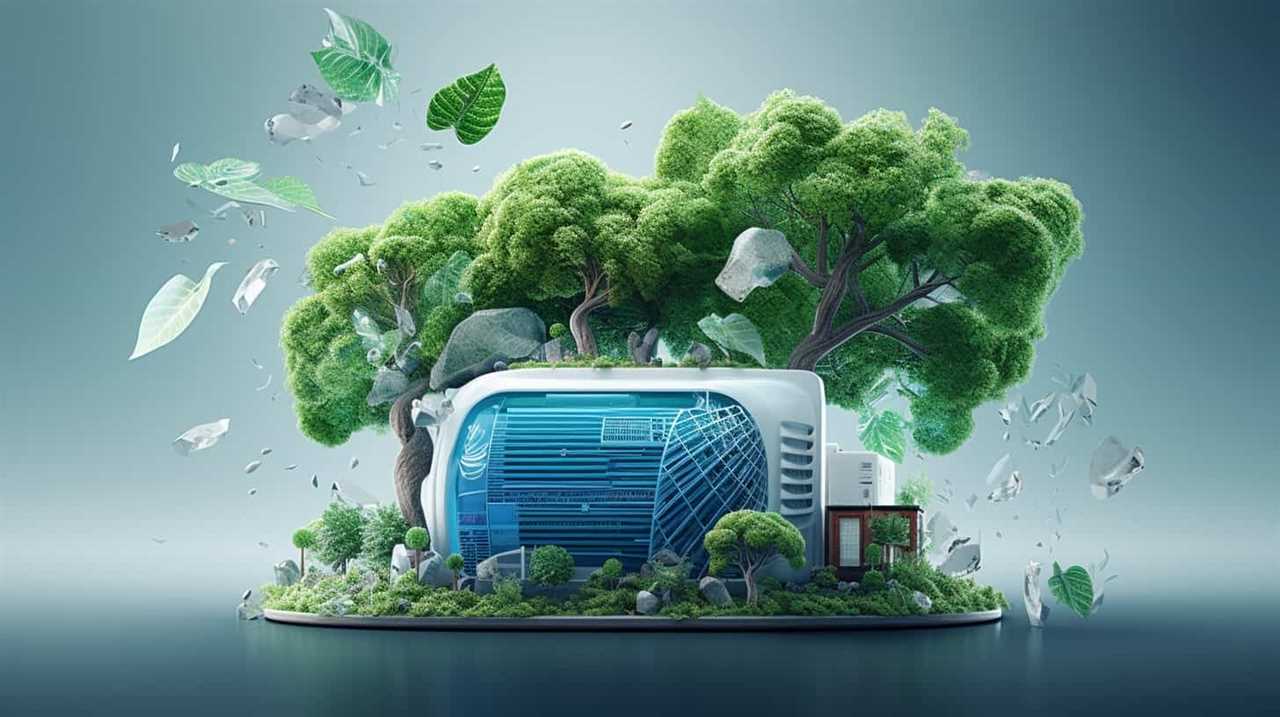
Smart controls play a crucial role in this process, allowing us to monitor and adjust the temperature settings with precision. These controls use sensors to gather data on indoor and outdoor conditions, enabling the heat pump system to optimize its performance and minimize energy consumption.
Additionally, energy management techniques help regulate the heat pump’s operation based on real-time energy demand and availability. By utilizing these advanced technologies, we can ensure that heat pump systems operate at their highest efficiency, providing optimal temperature regulation while minimizing energy waste.
Remote Monitoring Capabilities
By utilizing remote monitoring capabilities, we can effectively monitor and manage heat pump systems in real-time, ensuring optimal performance and energy efficiency. This technology allows us to collect valuable data on system operation, which can then be analyzed to identify patterns and trends. With this data analysis, we can gain insights into the system’s performance and energy consumption, enabling us to make informed decisions regarding maintenance and optimization.
Additionally, remote monitoring enables predictive maintenance, allowing us to detect potential issues before they cause a system failure. By addressing these issues proactively, we can minimize downtime and reduce repair costs. The ability to remotely monitor and manage heat pump systems not only improves overall performance but also enhances customer satisfaction by providing a reliable and efficient solution.
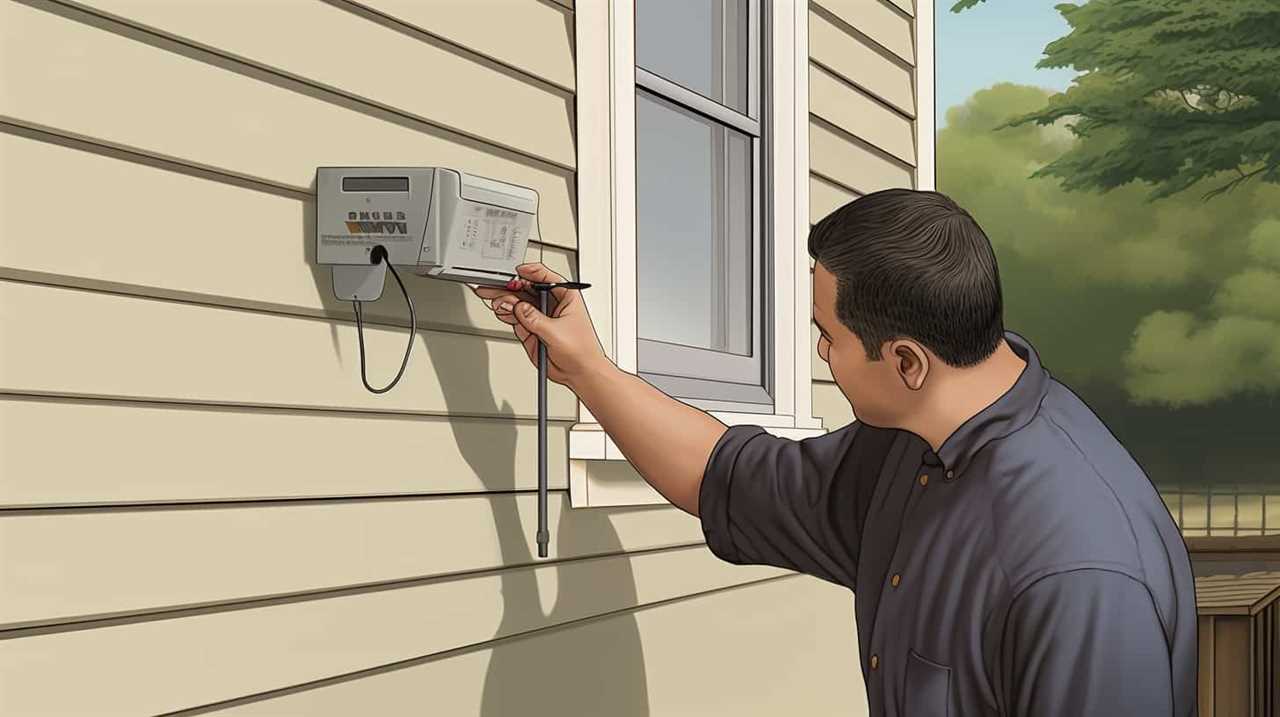
With the foundation of remote monitoring capabilities in place, let’s now explore the integration of heat pumps with renewable energy sources.
Heat Pump Integration With Renewable Energy Sources
When it comes to heat pump systems, integrating renewable energy sources offers numerous benefits.
Firstly, it allows for a reduction in carbon emissions and dependence on fossil fuels, making it a more sustainable and environmentally friendly option.
Secondly, the integration of renewables can significantly increase the energy efficiency of heat pump systems, resulting in lower energy costs for users.

Lastly, the growing market for renewable energy presents opportunities for innovation and expansion in the heat pump industry.
Benefits of Renewable Integration
Renewable integration offers numerous benefits when incorporating heat pumps with renewable energy sources. By combining these two technologies, we can achieve greater efficiency and environmental sustainability in our energy systems.
Here are four key advantages of renewable integration:
-
Reduced carbon emissions: Heat pumps, when powered by renewable energy sources such as solar or wind, produce significantly lower carbon emissions compared to traditional heating systems. This helps combat climate change and improve air quality.

-
Energy cost savings: Integrating heat pumps with renewable energy sources can lead to substantial energy cost savings. Renewable energy is often cheaper and more stable in price compared to fossil fuels, resulting in long-term financial benefits for homeowners and businesses.
-
Energy independence: By harnessing renewable energy sources, we become less reliant on finite fossil fuel resources. This enhances energy security and reduces our dependence on external energy suppliers.
-
Increased resilience: Renewable integration strengthens the resilience of our energy systems. Distributed renewable energy sources, combined with heat pumps, create a decentralized and robust energy infrastructure, making it more resilient to disruptions.
Energy Efficiency Advantages
Our energy efficiency is greatly enhanced through the integration of heat pumps with renewable energy sources.
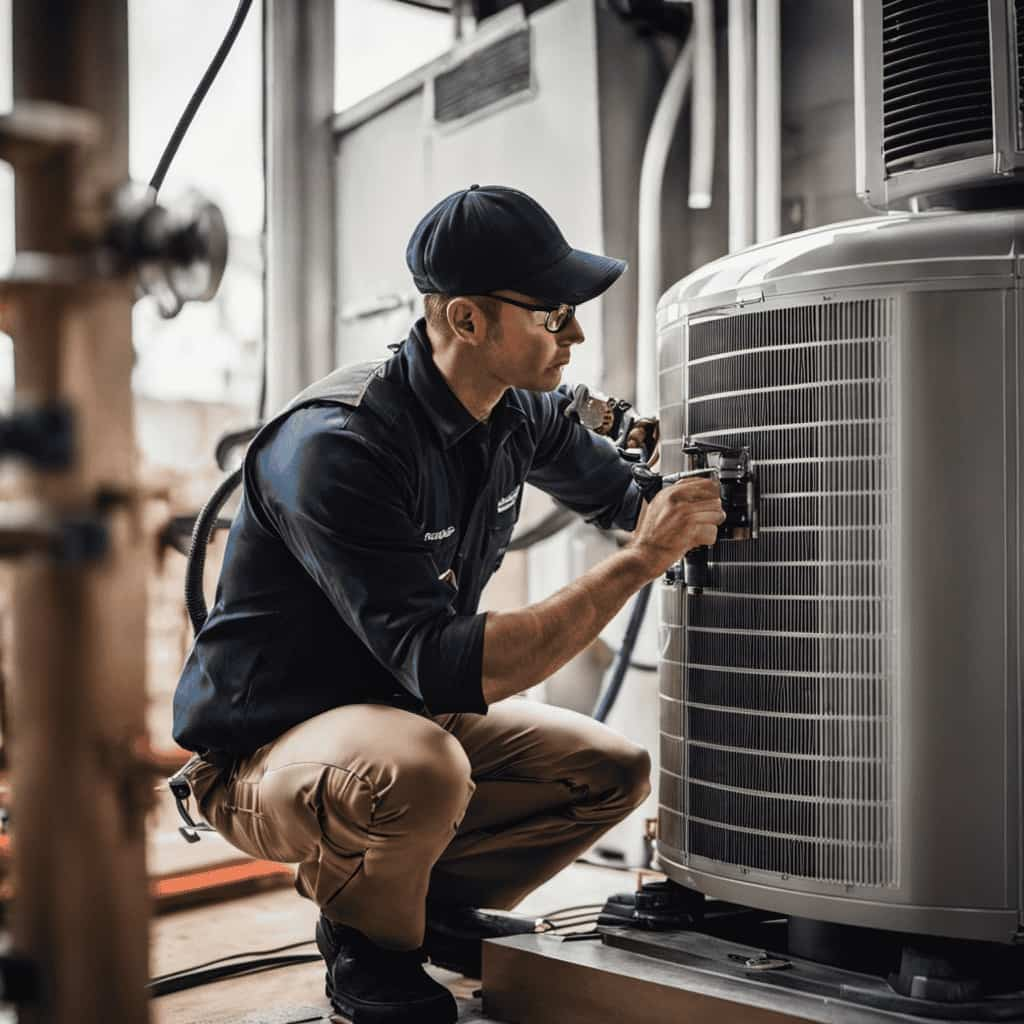
By combining these two technologies, we can achieve significant energy savings and reduce our environmental impact.
Heat pumps are highly efficient systems that can extract heat from the air, ground, or water and transfer it to heat or cool a space.
When paired with renewable energy sources such as solar or wind power, the heat pump’s efficiency is further maximized.
This integration allows us to tap into clean, renewable sources of energy and reduces our reliance on fossil fuels.
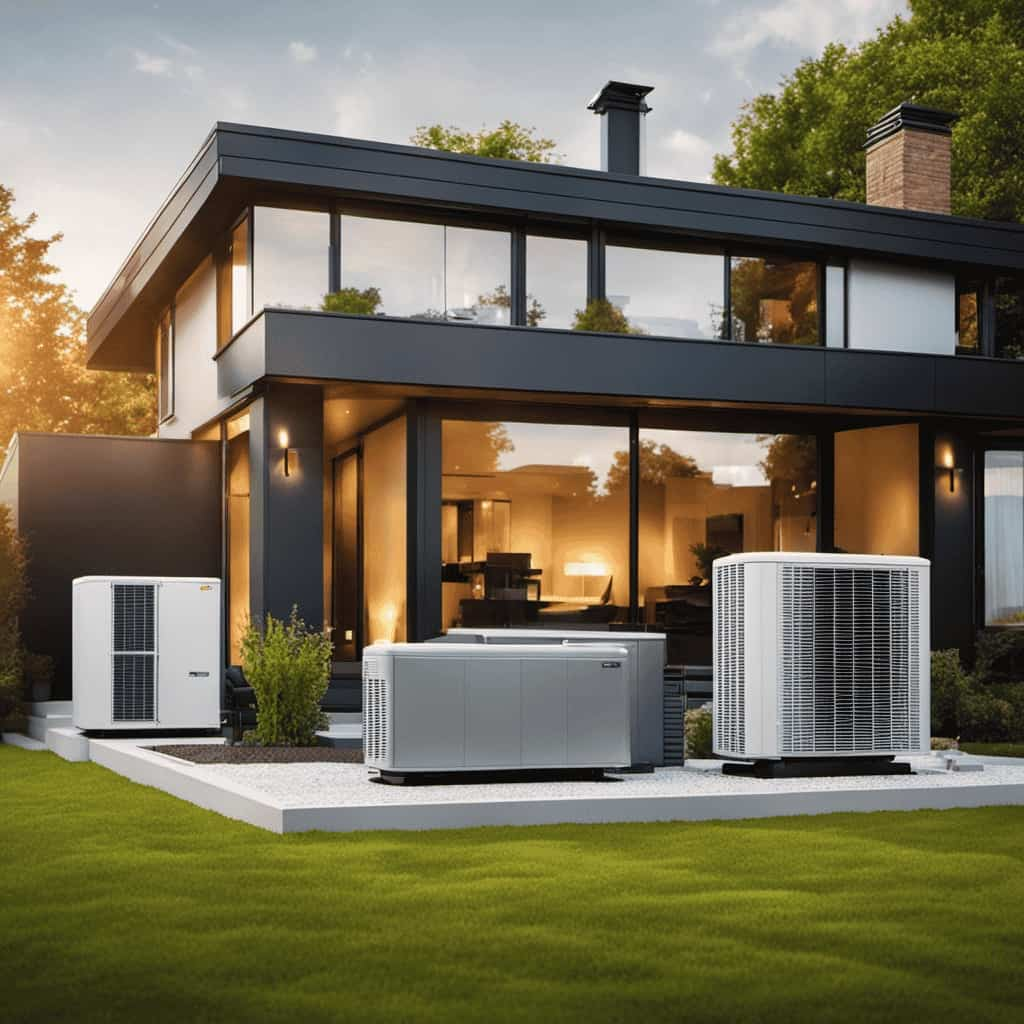
Furthermore, an environmental impact assessment can be conducted to evaluate the overall benefits of this integration, considering factors such as carbon emissions reduction and energy consumption.
Future Market Opportunities
We can explore future market opportunities by integrating heat pumps with renewable energy sources, maximizing energy efficiency and reducing environmental impact. This integration is crucial for meeting the increasing demand for sustainable heating and cooling solutions. Here are four key points to consider:
-
Increased market demand: As the world shifts towards renewable energy sources, the demand for heat pumps that can integrate with these sources will continue to grow. This presents a significant opportunity for future market growth.
-
Technological advancements: Emerging technologies, such as geothermal heat pumps and solar thermal systems, offer innovative ways to harness renewable energy for heat pump operation. These advancements enhance the performance and efficiency of heat pumps, further driving market growth.

-
Government incentives and policies: Governments worldwide are implementing various incentives and policies to encourage the adoption of renewable energy technologies. These initiatives create a favorable environment for the integration of heat pumps with renewable energy sources and contribute to future market expansion.
-
Environmental benefits: Heat pump integration with renewable energy sources significantly reduces greenhouse gas emissions and reliance on fossil fuels. This environmental advantage appeals to consumers who prioritize sustainability and encourages market growth.
As we consider the future market opportunities for heat pump integration with renewable energy sources, it’s essential to also discuss the design and installation considerations that play a vital role in maximizing the efficiency and effectiveness of these systems.
Heat Pump System Design and Installation Considerations
When designing and installing a heat pump system, it’s important to consider various factors that can impact its performance and efficiency. Two key considerations are heat pump system sizing and heat pump system zoning.
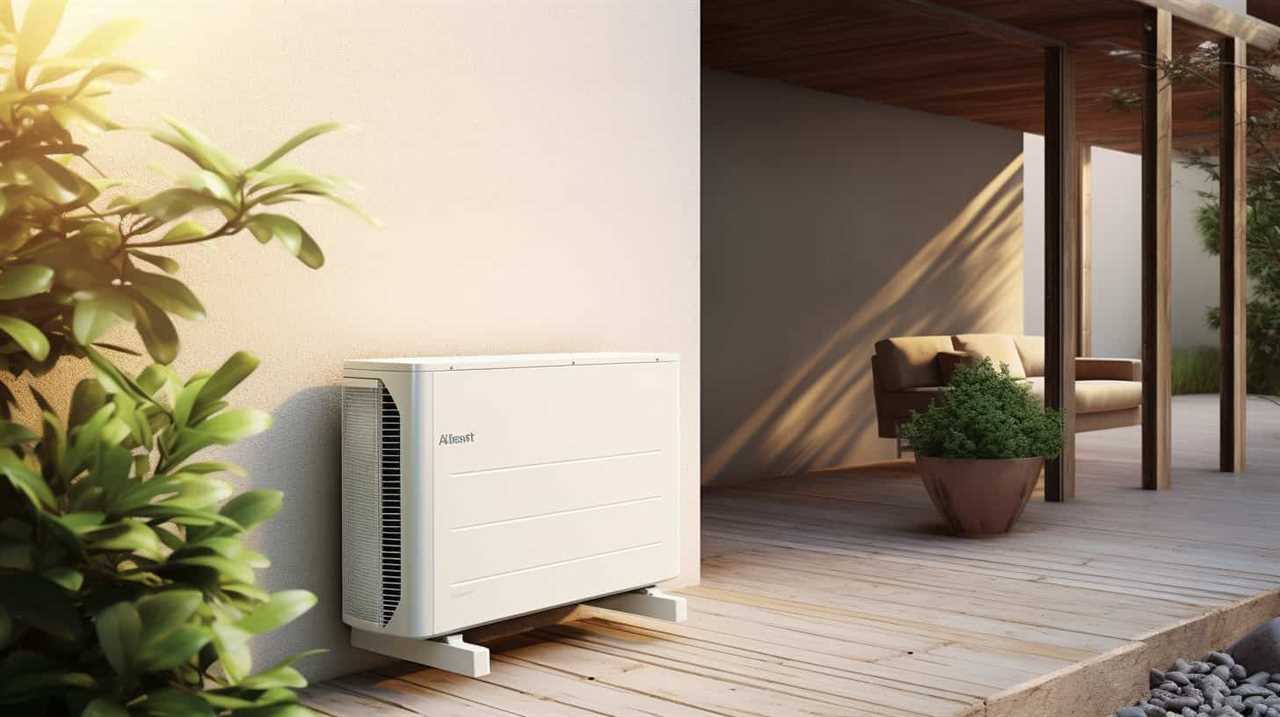
Heat pump system sizing involves properly determining the size and capacity of the system based on the heating and cooling load of the building. A system that’s too small will struggle to meet the demand, while a system that’s too large will cycle on and off frequently, leading to inefficiency and increased wear and tear.
Heat pump system zoning, on the other hand, involves dividing the building into different zones and controlling the temperature independently in each zone. This allows for greater comfort and energy efficiency by only heating or cooling the areas that are occupied.
Properly sizing and zoning the heat pump system are essential for optimizing its performance, efficiency, and overall customer satisfaction.
Troubleshooting and Maintenance Tips for Heat Pump Systems
As we delve into the subtopic of ‘Troubleshooting and Maintenance Tips for Heat Pump Systems’, it’s essential to understand the common issues and their fixes that often arise with these systems.
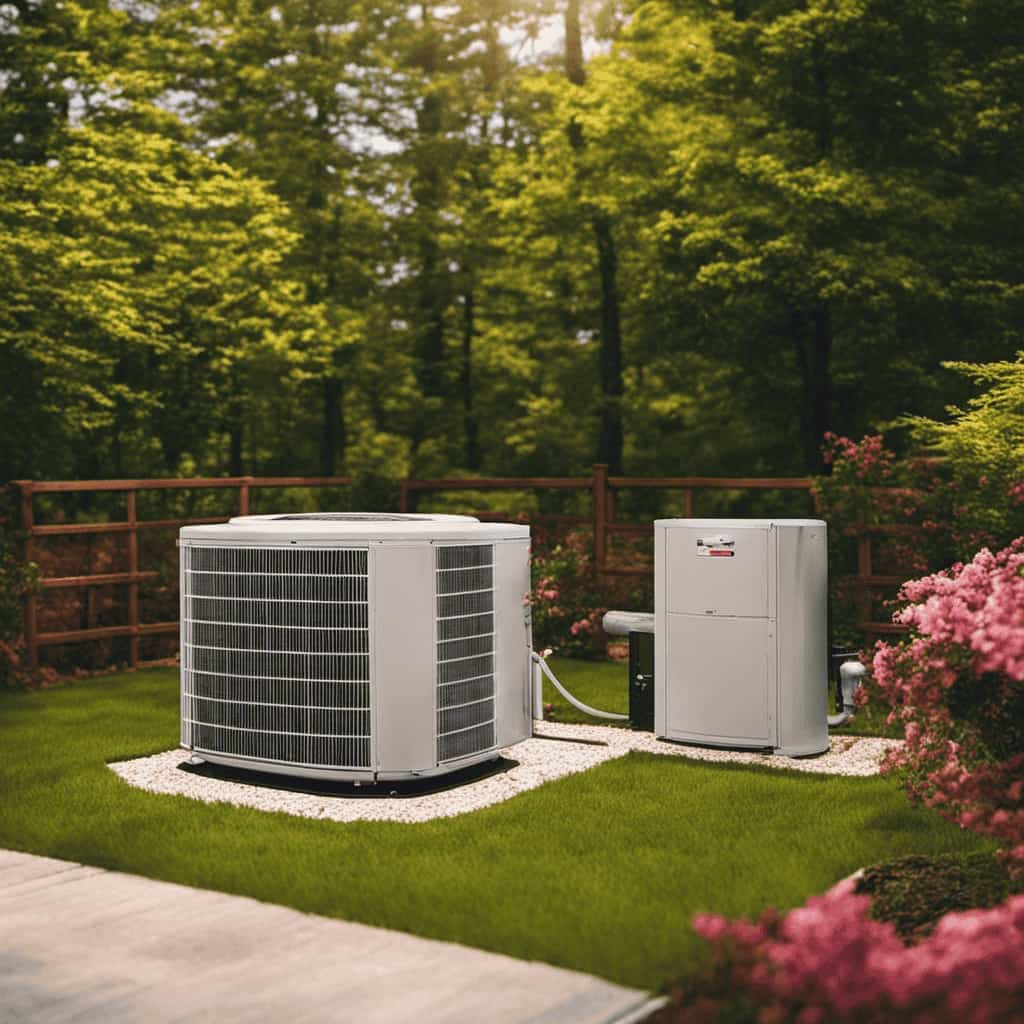
Additionally, a preventive maintenance checklist can help ensure the optimal performance and longevity of the heat pump system.
To provide expert troubleshooting advice, we’ll explore key troubleshooting techniques and strategies to identify and resolve issues efficiently.
Common Issues and Fixes
Our heat pump systems often encounter common issues that require troubleshooting and regular maintenance for optimal performance. Here are some common issues and their fixes that can help you address these problems effectively:
- Insufficient heating or cooling:
- Check if the thermostat is set correctly and the temperature is adjusted accordingly.
- Ensure that the air filters are clean and replace them if necessary.
- Also, check for any obstructions in the outdoor unit that may be hindering airflow.
- Strange noises:
- If you hear unusual noises like grinding or banging, it could indicate a problem with the motor or fan.
- Inspect the fan blades and motor for any damage and replace them if needed.
- Frequent cycling:
- If your heat pump frequently turns on and off, it could be due to a faulty thermostat or an issue with the refrigerant levels.
- Check the thermostat settings and have a professional inspect and recharge the refrigerant if necessary.
- Ice buildup:
- Ice formation on the outdoor unit can indicate a problem with the defrost cycle or airflow.
- Ensure that the defrost cycle is functioning properly and check for any obstructions in the outdoor unit.
By addressing these common issues and implementing appropriate fixes, you can ensure that your heat pump system operates efficiently.
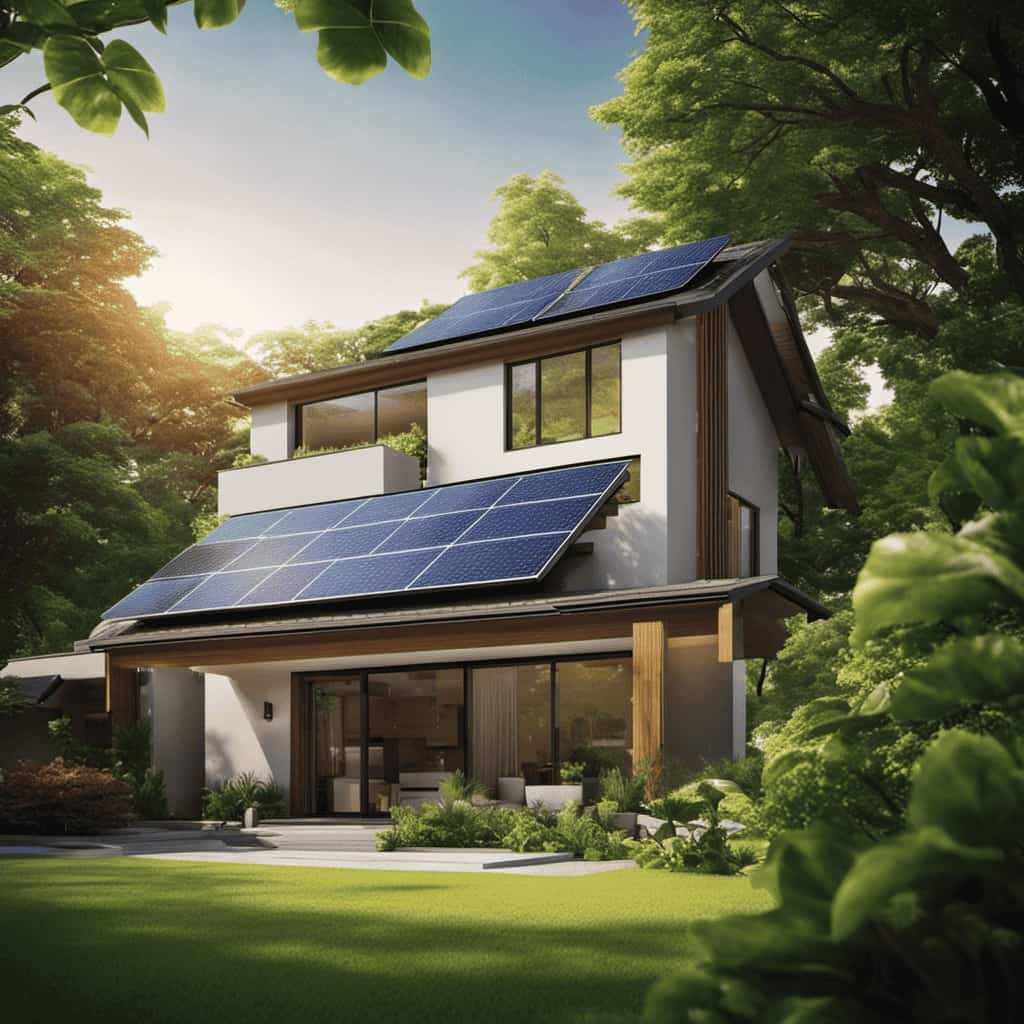
Now, let’s move on to the next section, where we’ll discuss a preventive maintenance checklist to keep your heat pump system in top condition.
Preventive Maintenance Checklist
To ensure optimal performance, we recommend following a preventive maintenance checklist and implementing troubleshooting and maintenance tips for your heat pump system. Regular maintenance is essential to keep your system running efficiently and prevent costly breakdowns. Here are some maintenance best practices to include in your preventive maintenance schedule:
| Maintenance Task | Frequency | Action Required |
|---|---|---|
| Clean or replace filters | Monthly | Remove and clean reusable filters, replace disposable ones |
| Check refrigerant levels | Annually | Ensure proper refrigerant levels and top-up if necessary |
| Inspect and clean coils | Annually | Remove debris and buildup from coils for efficient heat transfer |
Expert Troubleshooting Advice
We can troubleshoot and provide maintenance tips for heat pump systems to help you address common issues and keep your system running smoothly.
Here are some expert troubleshooting techniques to help you troubleshoot and resolve common problems:
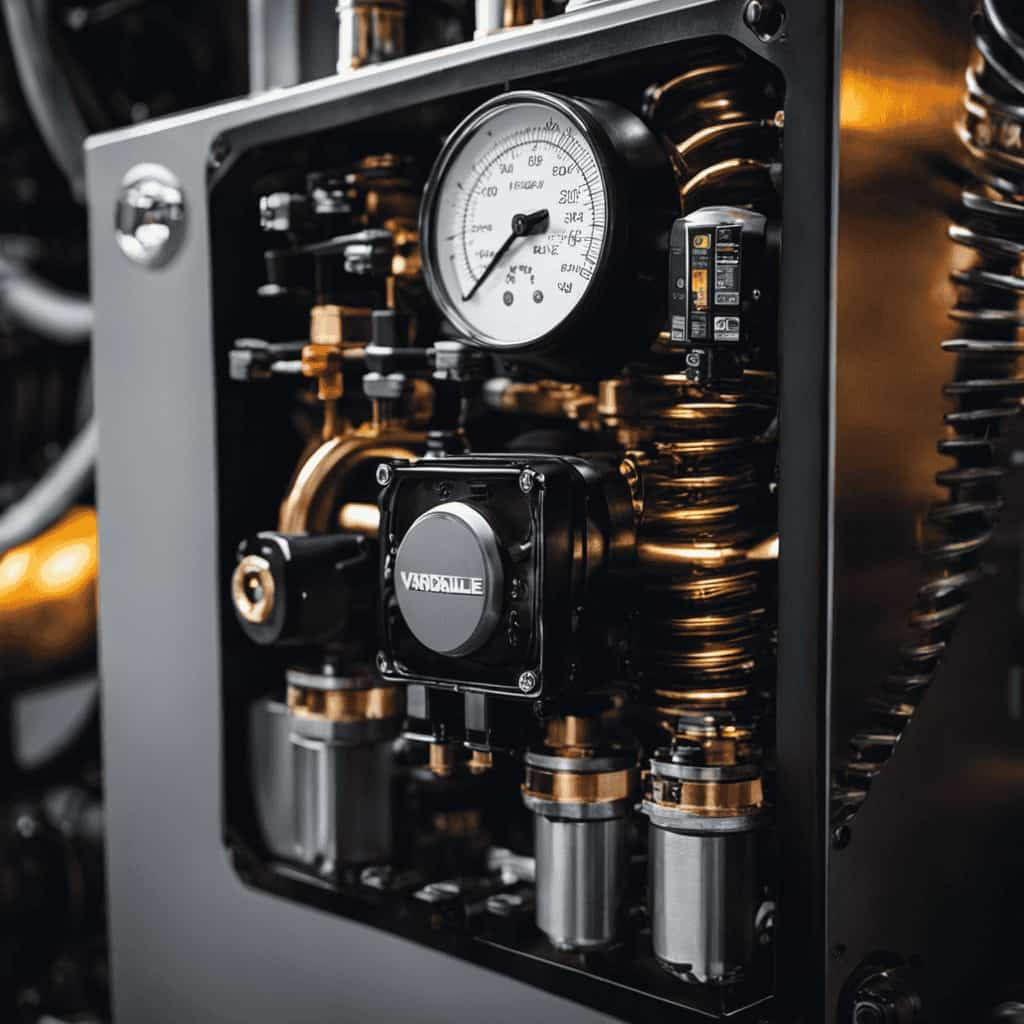
-
Check the thermostat:
Ensure that the thermostat is set to the desired temperature and that it’s functioning properly. Replace batteries if needed. -
Inspect the air filters:
Dirty or clogged air filters can restrict airflow, reducing the efficiency of your heat pump system. Clean or replace the filters regularly. -
Examine the outdoor unit:
Clear any debris or obstructions around the outdoor unit. Ensure that the unit is free from dirt and leaves, as this can affect its performance. -
Verify the refrigerant levels:
Low refrigerant levels can indicate a leak in the system. Consult a professional to check and replenish the refrigerant if necessary.
Frequently Asked Questions
What Is the Average Cost of Installing a Heat Pump System?
The average cost of installing a heat pump system depends on various factors, such as the size of the system, the efficiency rating, and the complexity of the installation.
Are Heat Pumps Noisy When They Are Operating?
Yes, heat pumps can be noisy when operating, but modern innovations have significantly reduced noise levels. With advancements in heat pump noise reduction technology, you can enjoy the benefits of a heat pump system without the disturbance of excessive noise.
Can a Heat Pump System Be Used for Both Heating and Cooling Purposes?
Yes, a heat pump system can be used for both heating and cooling purposes. This provides increased efficiency and the benefits of a versatile system. Heat pump systems offer energy savings and year-round comfort.
How Long Do Heat Pump Systems Typically Last Before Needing to Be Replaced?
Heat pump systems typically last 15-20 years before needing replacement. To extend their lifespan, regular maintenance is crucial. By following proper heat pump maintenance tips, you can maximize the benefits of these efficient heating and cooling systems.
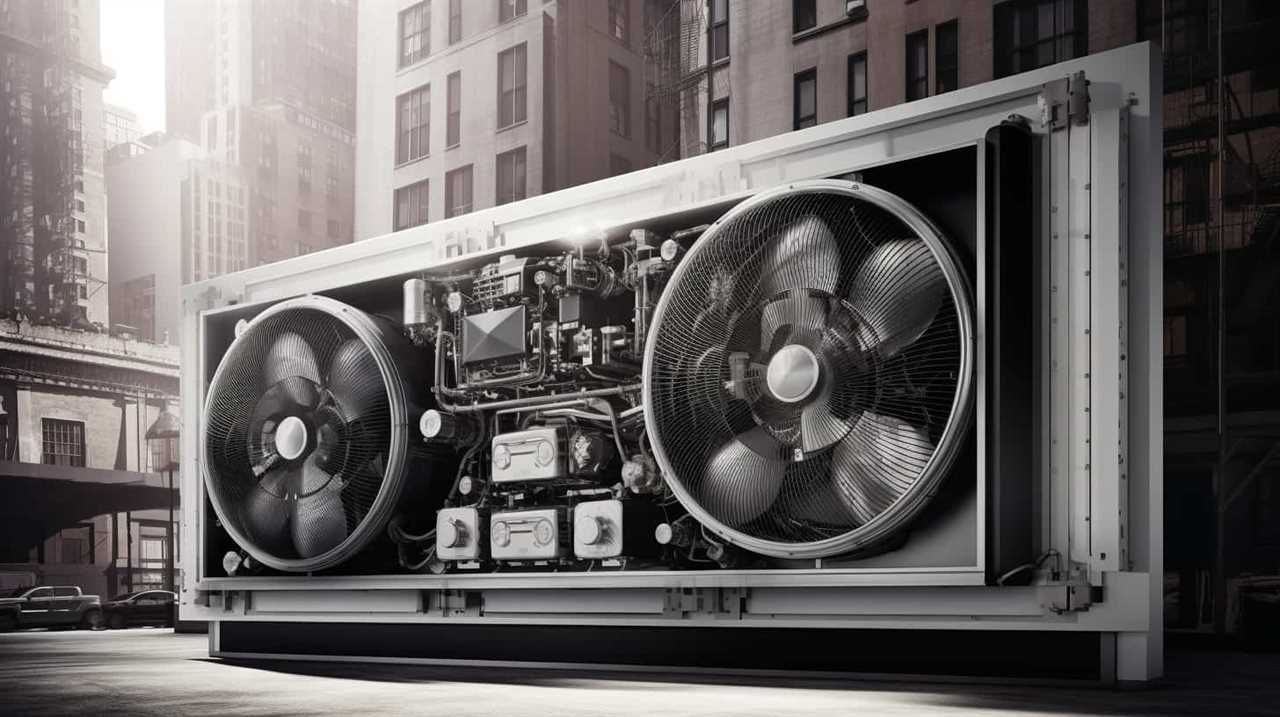
Are There Any Government Incentives or Rebates Available for Installing a Heat Pump System?
Yes, there are government incentives and rebates available for installing a heat pump system. These programs aim to encourage energy savings and provide financial assistance to those who choose more efficient heating and cooling solutions.
Conclusion
In conclusion, mastering modern heat pump system innovations is like navigating through a sea of possibilities.
With advanced compressor technology, innovative refrigerants, and variable speed systems, heat pumps have become more efficient and effective than ever before.
Smart controls and integration with renewable energy sources further enhance their performance.
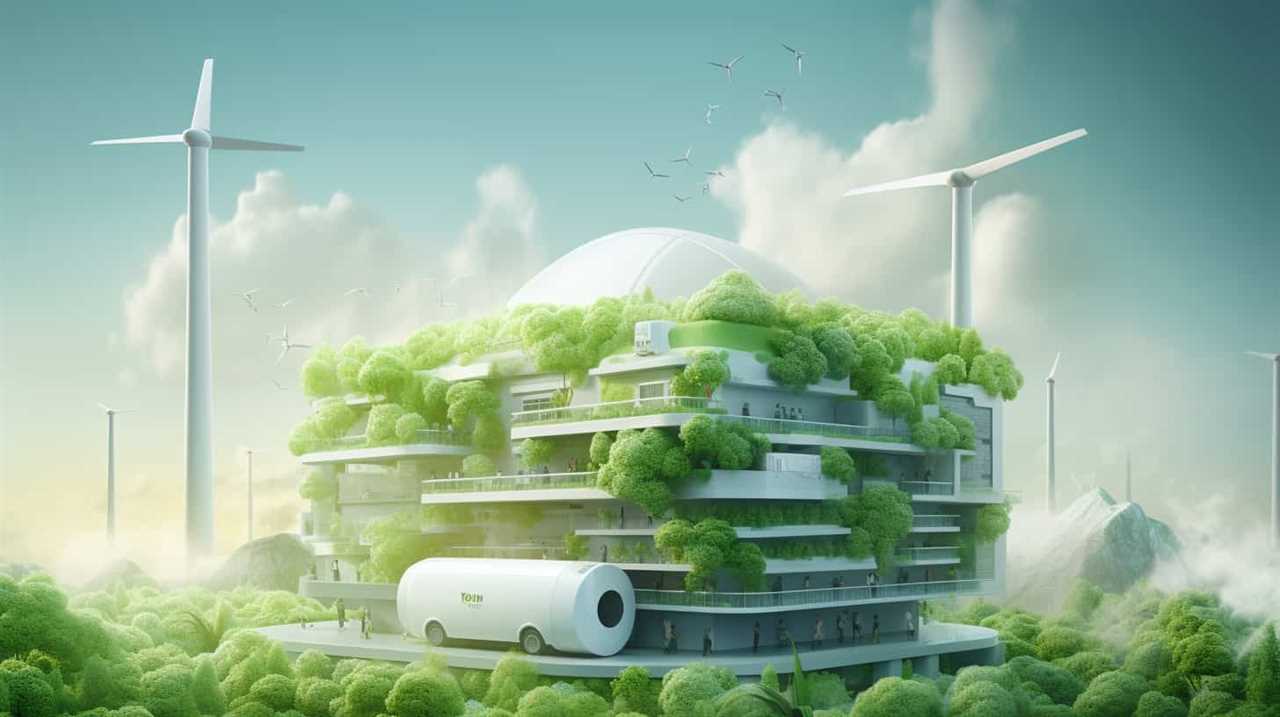
However, proper design, installation considerations, and regular troubleshooting and maintenance are crucial to ensure their optimal functioning.
Just like a well-tuned instrument, a well-maintained heat pump system can orchestrate comfort and energy efficiency in perfect harmony.
Thermal Energy Transfer
Boost Heat Pump Efficiency: Renewable Energy’s Unexpected Power

Are you prepared to unleash the complete capabilities of your heat pump? Search no more! In this article, we will delve into the surprising impact of renewable energy on enhancing heat pump effectiveness.
Get ready to revolutionize your heating system as we delve into the role of solar energy, harnessing geothermal power, the game-changing wind energy, sustainable biomass solutions, and the untapped potential of hydropower.
Prepare to master the art of maximizing heat pump performance with the help of renewable energy sources.
Key Takeaways
- Solar panel integration allows for the direct conversion of sunlight into electricity, reducing reliance on traditional power sources.
- Geothermal energy can maximize heat pump performance by providing heat stored beneath the Earth’s surface, leading to higher levels of efficiency.
- Wind power can revolutionize heat pump efficiency by generating electricity to power heat pumps, reducing their carbon footprint.
- Biomass combined with heat pump technology greatly enhances efficiency and sustainability, reducing reliance on fossil fuels and emitting fewer greenhouse gases.
The Role of Solar Energy in Enhancing Heat Pump Efficiency
We can enhance heat pump efficiency by utilizing solar energy. Solar panel integration plays a crucial role in harnessing renewable energy for heat pumps. By connecting solar panels to heat pump systems, we can directly convert sunlight into electricity, reducing reliance on traditional power sources. This integration allows heat pumps to operate more efficiently, as they can draw power from the solar panels during daylight hours.
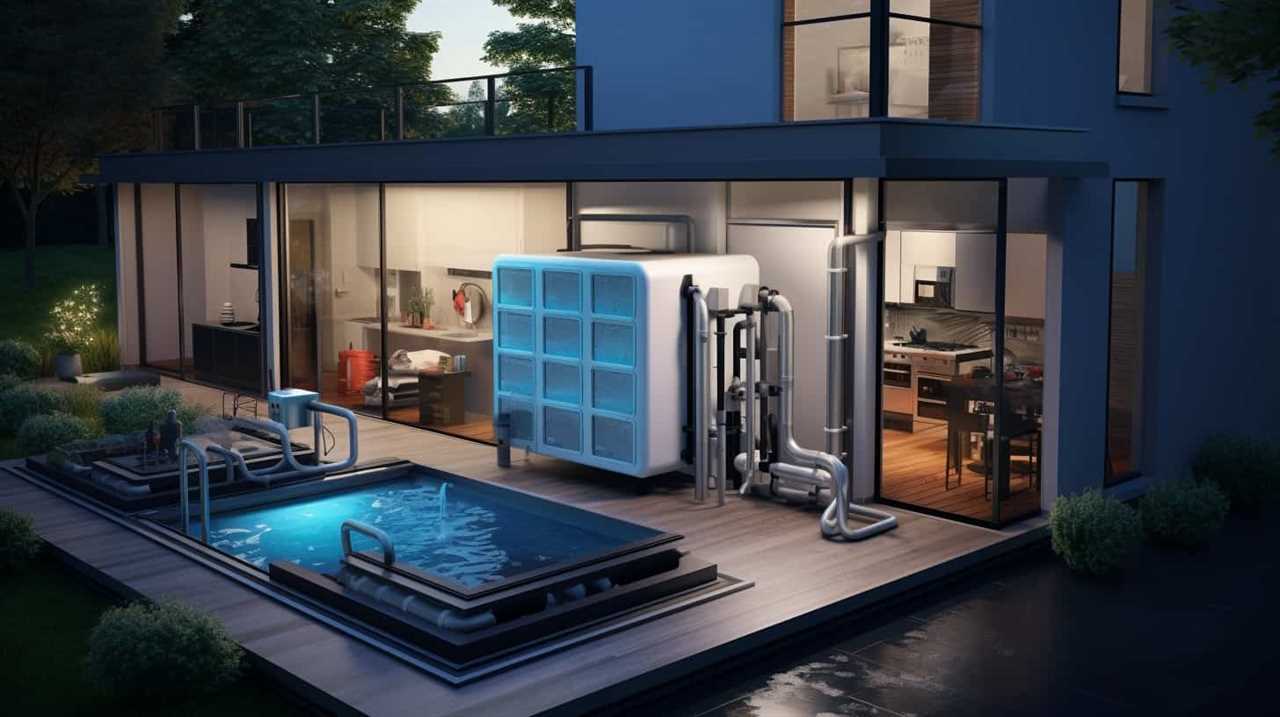
Additionally, energy storage solutions can further optimize heat pump performance. Storing excess solar energy in batteries or other storage systems ensures a continuous power supply for heat pumps, even when sunlight is limited.
This combination of solar panel integration and energy storage solutions maximizes the utilization of renewable energy, significantly improving heat pump efficiency.
Harnessing Geothermal Power to Maximize Heat Pump Performance
One way to maximize heat pump performance is by harnessing the power of geothermal energy. Geothermal energy is heat that is stored beneath the Earth’s surface in geothermal reservoirs. This heat can be extracted and used to provide heating and cooling for buildings. Geothermal innovations have made it possible to tap into this renewable energy source and optimize the efficiency of heat pumps.
By utilizing geothermal energy, heat pumps can achieve higher levels of efficiency compared to traditional heating and cooling systems. The table below illustrates the advantages of harnessing geothermal power for heat pump performance:
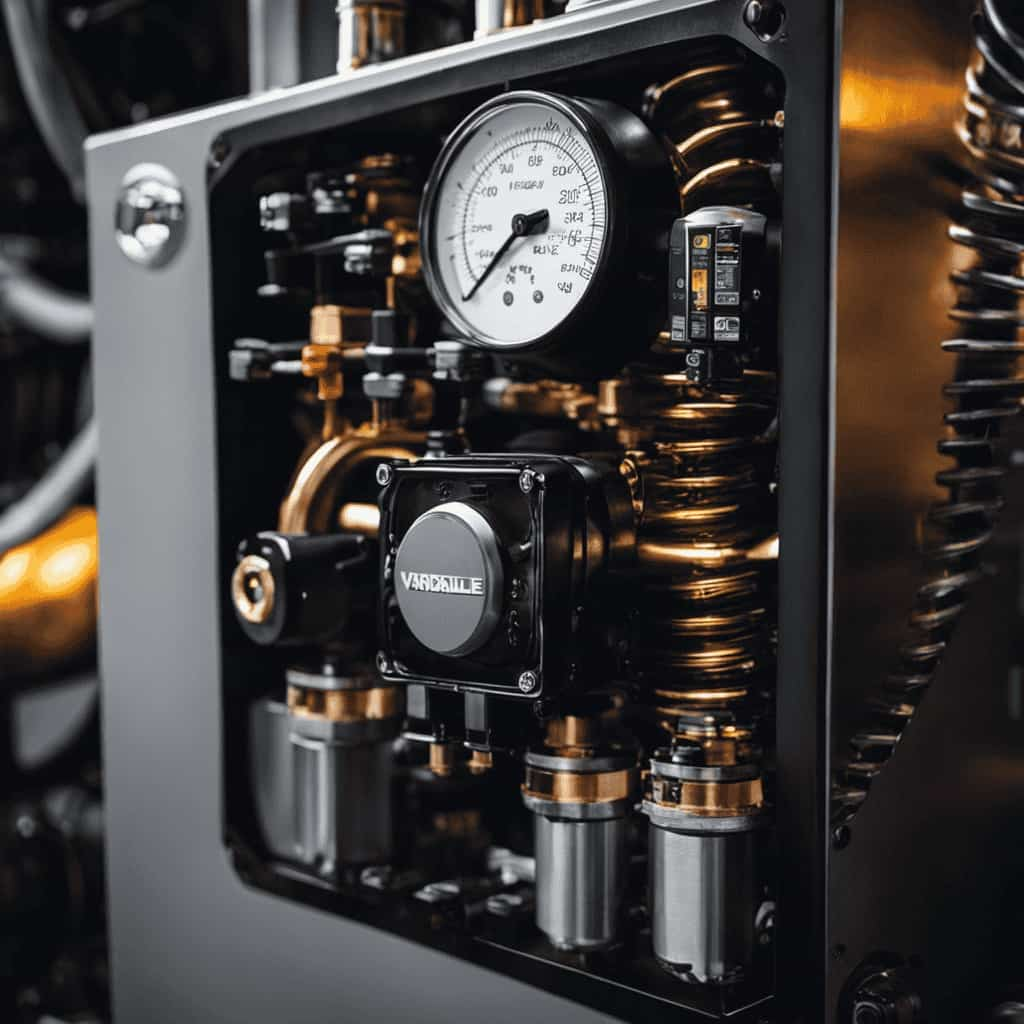
| Advantages of Geothermal Power for Heat Pump Performance |
|---|
| Higher efficiency |
| Reduced energy consumption |
| Lower operating costs |
| Environmentally friendly |
Harnessing geothermal power not only improves the performance of heat pumps but also contributes to a more sustainable and energy-efficient future. By utilizing the abundant geothermal resources available, we can maximize the efficiency of heat pumps and reduce our carbon footprint.
Wind Energy: A Game-Changer for Heat Pump Efficiency
Harnessing wind energy can revolutionize heat pump efficiency.
Wind energy has the potential to be a game changer for heat pump technology, offering significant benefits to renewable energy solutions.
By utilizing wind power to generate electricity, heat pumps can operate more efficiently and reduce their carbon footprint.

Wind turbines can produce large amounts of electricity, which can be used to power heat pumps, allowing them to operate at higher efficiencies.
Additionally, wind energy is a clean and renewable source, making it an environmentally friendly option for heat pump systems.
The integration of wind energy into heat pump technology enhances the overall performance and sustainability of these systems.
Biomass: A Sustainable Solution for Boosting Heat Pump Efficiency
Using biomass as a renewable fuel source and combining it with heat pump technology can greatly enhance efficiency and sustainability. Biomass, which refers to organic materials such as wood, agricultural residues, and dedicated energy crops, offers a promising alternative fuel for heat pumps. By harnessing the energy stored in biomass, heat pumps can provide a reliable and efficient heating solution while reducing reliance on fossil fuels. The innovative combination of biomass and heat pump technology allows for a more sustainable heating system that emits fewer greenhouse gases and decreases overall energy consumption. To illustrate the potential benefits of this approach, consider the table below, which compares the energy efficiency and carbon emissions of biomass-powered heat pumps to conventional heating systems.
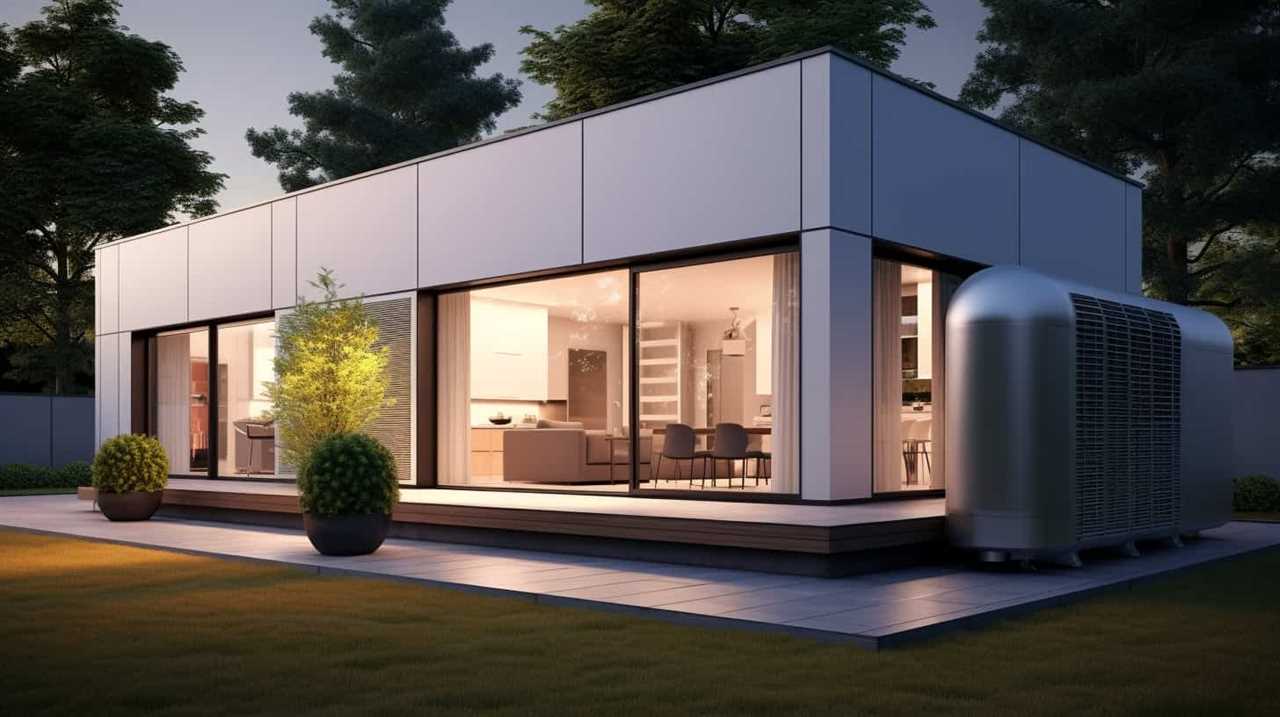
| Heating System | Energy Efficiency (COP) | Carbon Emissions (kgCO2/MWh) |
|---|---|---|
| Biomass Heat Pump | 4.5 | 10 |
| Natural Gas Boiler | 0.9 | 200 |
| Oil Boiler | 0.85 | 250 |
| Electric Resistance | 1 | 500 |
| Air-Source Heat Pump | 3 | 60 |
As shown in the table, biomass heat pumps have a significantly higher energy efficiency and lower carbon emissions compared to other heating systems. This makes them an attractive and sustainable solution for boosting heat pump efficiency.
Hydropower: Unleashing the Potential of Water to Improve Heat Pump Performance
We can maximize heat pump performance by tapping into the immense potential of hydropower, using water as a renewable energy source. Hydropower, also known as hydroelectric power, offers several advantages in improving heat pump efficiency.
- Water Efficiency:
- Hydropower utilizes the natural flow of water, harnessing its kinetic energy to generate electricity.
- This process doesn’t consume water, making it a highly water-efficient energy source.
- Heat pumps can benefit from this water efficiency by leveraging hydropower for their operations, reducing overall water consumption.
- Hydroelectric Power:
- Hydropower plants can generate a significant amount of electricity, providing a reliable and consistent power source for heat pumps.
- The scalability of hydropower allows for large-scale generation, accommodating the increasing demand for heat pump installations.
- By integrating hydropower into heat pump systems, we can enhance their performance and contribute to a more sustainable and efficient energy ecosystem.
Harnessing the power of water through hydropower can significantly improve heat pump performance, ensuring optimal energy utilization and reducing environmental impact.
Frequently Asked Questions
What Are the Key Factors to Consider When Choosing a Heat Pump for Optimal Efficiency?
When choosing a heat pump for optimal efficiency, key factors to consider include heat pump installation and heat pump sizing. These factors play a crucial role in maximizing energy efficiency and ensuring optimal performance.
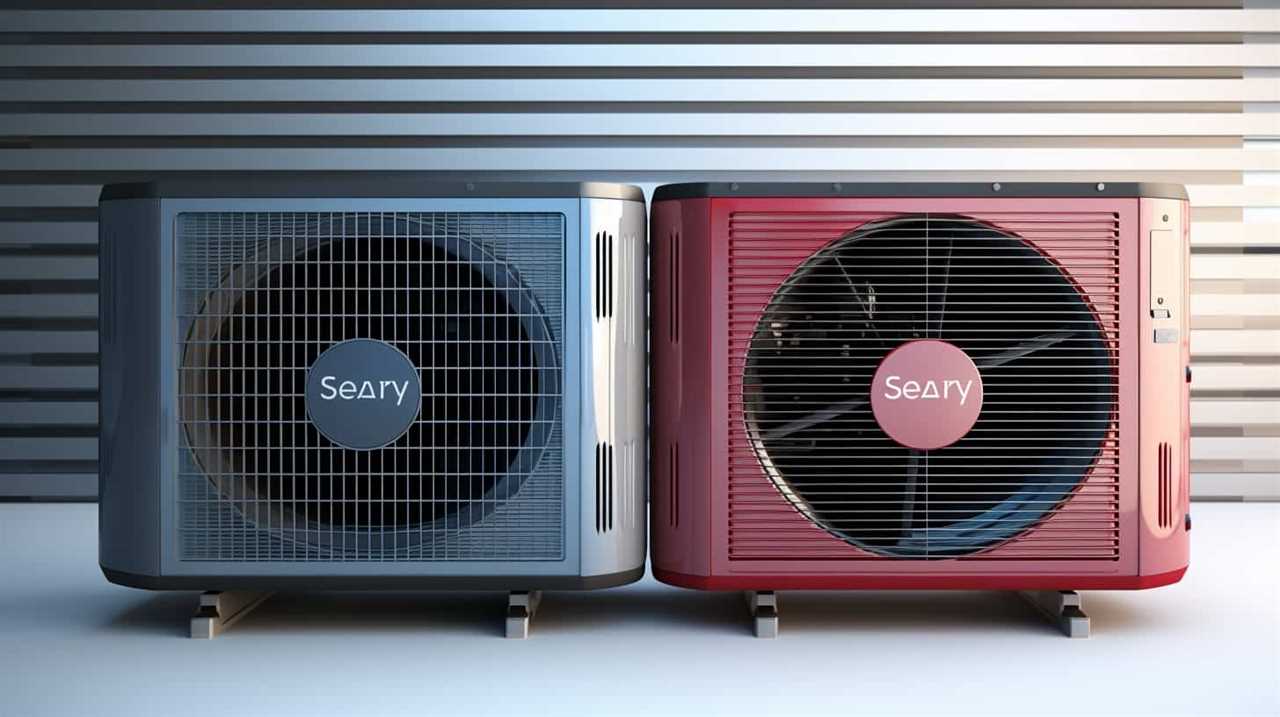
Can Heat Pumps Be Used in All Types of Climates or Are They More Suitable for Specific Regions?
Heat pumps can be used in all types of climates, but their efficiency may vary in extreme conditions. Some limitations include reduced performance in very cold regions and the need for additional heating sources.
Are There Any Government Incentives or Tax Credits Available for Installing Heat Pumps?
There are government incentives and tax credits available for installing heat pumps. These incentives can significantly reduce the upfront cost and make renewable energy more accessible to homeowners and businesses.
How Long Does It Typically Take for a Heat Pump to Pay for Itself in Terms of Energy Savings?
The heat pump payback period depends on various factors, including energy costs, climate, and insulation. It typically takes about 5-10 years for a heat pump to pay for itself in terms of energy savings.
Are There Any Maintenance Requirements or Recommended Practices to Ensure the Long-Term Efficiency of a Heat Pump?
To ensure long-term efficiency, heat pumps require regular maintenance and adherence to recommended practices. These include cleaning or replacing air filters, checking refrigerant levels, and inspecting electrical components. Neglecting these requirements can result in decreased performance and higher energy consumption.
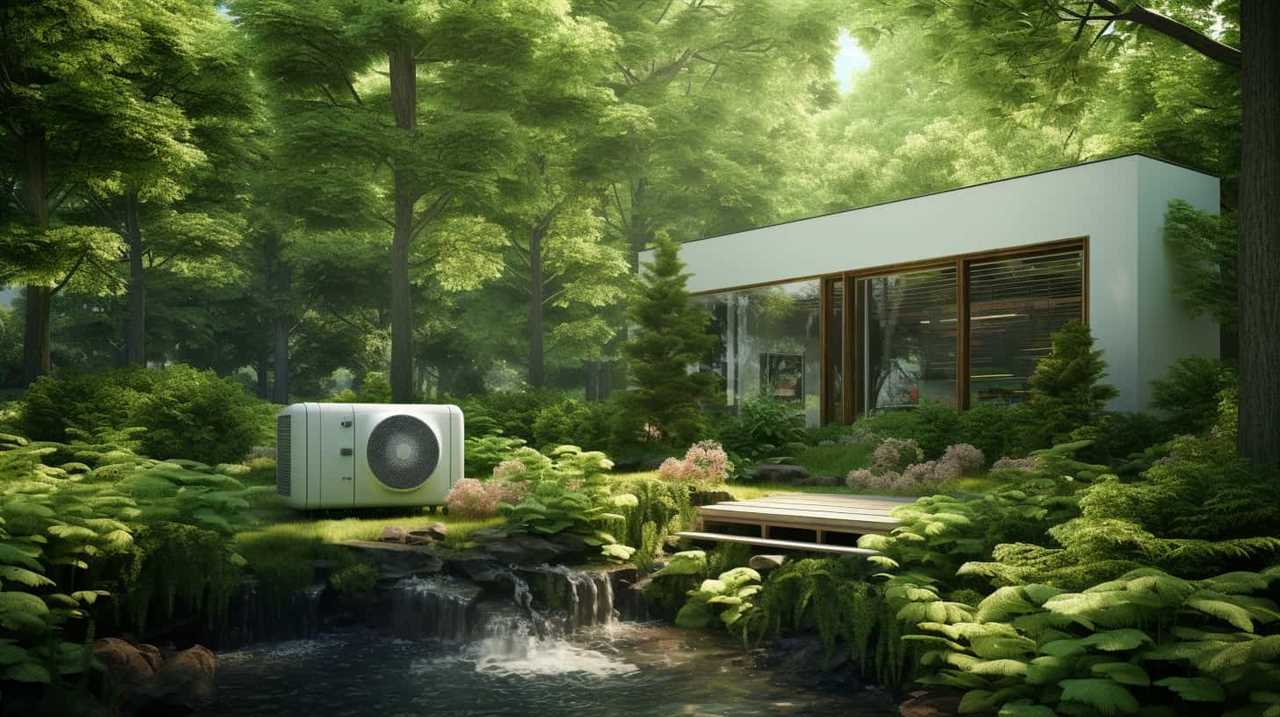
Conclusion
In conclusion, renewable energy sources such as solar, geothermal, wind, biomass, and hydropower play a crucial role in boosting heat pump efficiency.
One interesting statistic to note is that harnessing solar energy can increase heat pump performance by up to 40%, while utilizing geothermal power can improve efficiency by up to 50%.
These renewable energy solutions not only provide sustainable alternatives to traditional heating methods but also contribute to a more energy-efficient and environmentally friendly future.
Thermal Energy Transfer
Decoding Heat Pumps’ Energy Efficiency Ratings: A Guide

Welcome to our guide on understanding the energy efficiency ratings of heat pumps! Have you ever been confused by the numbers and acronyms? We’re here to assist you.
In this article, we’ll break down the importance of energy efficiency ratings, how they’re calculated, and the key metrics to look out for.
We’ll also provide tips on maximizing your heat pump’s performance.
So, let’s dive in and uncover the secrets to choosing the most efficient heat pump for your needs.
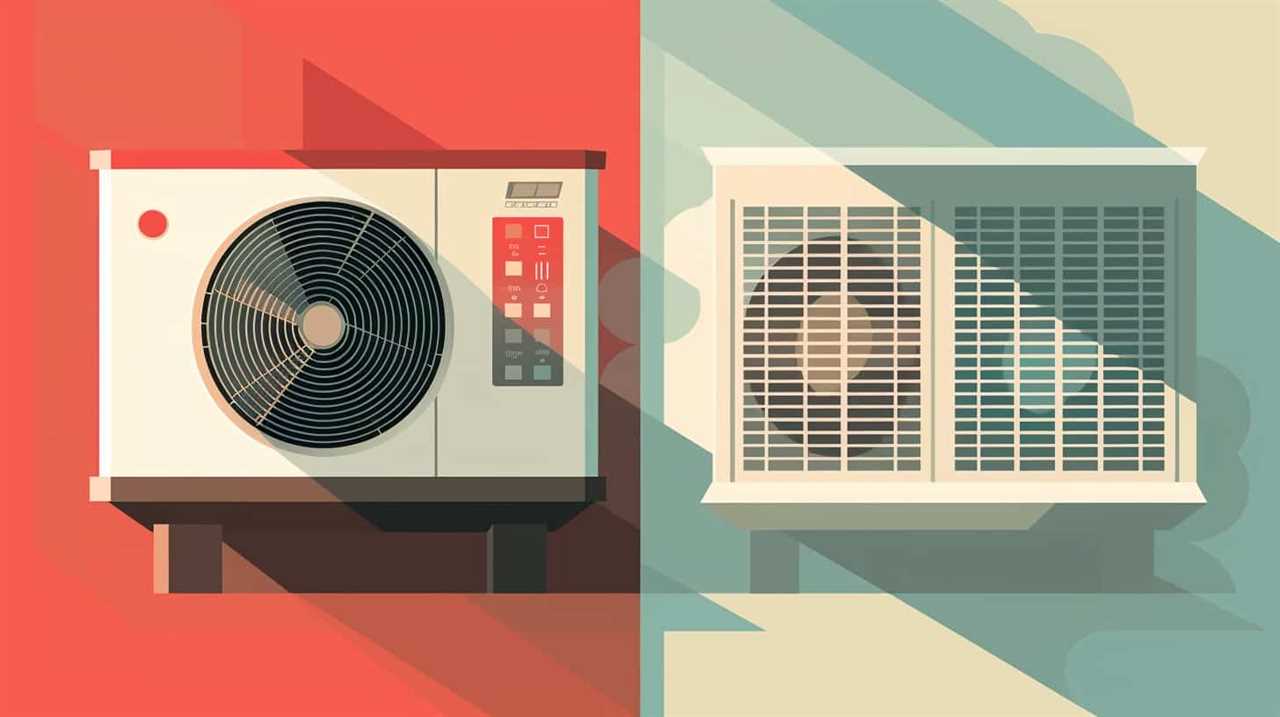
Key Takeaways
- Energy efficiency ratings are important in determining the effectiveness and cost savings of heat pumps.
- Higher efficiency ratings indicate lower energy consumption and can lead to reduced energy bills.
- Heat pumps with higher efficiency ratings often qualify for rebates and incentives.
- Evaluating energy efficiency ratings helps in making informed decisions and maximizing the benefits of heat pumps.
The Importance of Energy Efficiency Ratings in Heat Pumps
We believe that energy efficiency ratings play a crucial role in determining the effectiveness of heat pumps. When evaluating energy savings and long-term cost benefits, it’s important to consider the efficiency rating of a heat pump.
An energy efficiency rating provides a measure of how effectively a heat pump converts electricity into heat. Higher efficiency ratings indicate that the heat pump is more efficient in converting energy, resulting in lower energy consumption and ultimately, cost savings.
By choosing a heat pump with a high energy efficiency rating, homeowners can reduce their energy bills and minimize their environmental impact. Additionally, heat pumps with higher efficiency ratings often qualify for rebates and incentives, further enhancing the long-term cost benefits.
Evaluating energy efficiency ratings is therefore essential in making informed decisions and maximizing the benefits of heat pump technology.

How Energy Efficiency Ratings Are Calculated for Heat Pumps
To determine the energy efficiency rating of a heat pump, manufacturers use standardized testing procedures to measure its performance and calculate the ratio of heat output to electricity input. This calculation process takes into account various factors that affect the efficiency of the heat pump.
Here are some of the factors considered:
- Seasonal Energy Efficiency Ratio (SEER): This measures the cooling efficiency of the heat pump during the cooling season.
- Heating Seasonal Performance Factor (HSPF): This measures the heating efficiency of the heat pump during the heating season.
- Coefficient of Performance (COP): This measures the overall efficiency of the heat pump by considering both the cooling and heating modes.
Understanding SEER and HSPF: Key Energy Efficiency Metrics for Heat Pumps
SEER and HSPF are important energy efficiency metrics that help consumers understand the performance of heat pumps.
When it comes to evaluating the energy efficiency of heat pumps, it’s essential to understand the differences between SEER and HSPF ratings.

SEER, or Seasonal Energy Efficiency Ratio, measures the cooling efficiency of the heat pump. It calculates the amount of cooling output divided by the energy input over a cooling season. The higher the SEER rating, the more energy-efficient the heat pump is in cooling mode.
On the other hand, HSPF, or Heating Seasonal Performance Factor, measures the heating efficiency of the heat pump. It calculates the amount of heating output divided by the energy input over a heating season. A higher HSPF rating indicates better heating efficiency.
Both SEER and HSPF ratings are important when evaluating the energy efficiency of heat pumps. The choice between the two depends on the climate and the specific heating and cooling needs of the consumer. In warmer climates, where cooling demands are higher, SEER rating becomes more important. In colder climates, where heating demands are higher, HSPF rating is more significant.
To make an informed decision, it’s crucial to consider both SEER and HSPF ratings in order to choose a heat pump that meets your specific energy efficiency needs.

Comparing Energy Efficiency Ratings: What to Look for in Heat Pump Models
When comparing energy efficiency ratings, it’s important to regularly and carefully examine the different features of heat pump models. Here are three key aspects to consider when evaluating energy efficiency in heat pump models:
-
Seasonal Energy Efficiency Ratio (SEER): This rating measures the cooling efficiency of the heat pump. Look for a higher SEER rating, as it indicates better energy efficiency and lower operating costs during the cooling season.
-
Heating Seasonal Performance Factor (HSPF): HSPF measures the heating efficiency of the heat pump. A higher HSPF rating means better energy efficiency and lower heating costs during the heating season.
-
Energy Star Certification: Look for heat pump models that have earned the Energy Star certification. These models meet strict energy efficiency guidelines set by the Environmental Protection Agency (EPA) and can help you save on energy usage and costs.
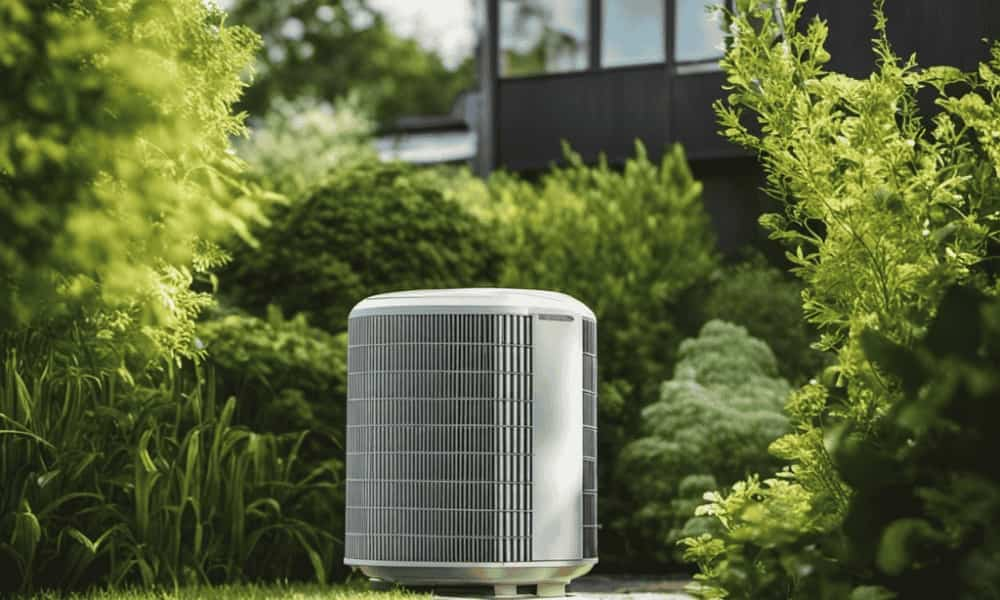
By considering these factors, you can make an informed decision when selecting a heat pump model that prioritizes energy efficiency.
In the next section, we’ll explore tips for maximizing energy efficiency and improving heat pump performance.
Maximizing Energy Efficiency: Tips for Improving Heat Pump Performance
To ensure that we get the most out of our heat pump and maximize its energy efficiency, we should implement these tips for improving its performance. First, regular maintenance is crucial for optimal operation. This includes cleaning or replacing air filters, inspecting and cleaning coils, and checking refrigerant levels. By keeping our heat pump in top condition, we can ensure that it operates efficiently and effectively. Additionally, optimizing the settings on our heat pump can make a significant difference in energy efficiency. Adjusting the thermostat to an appropriate temperature and utilizing programmable settings can help reduce energy consumption. It is also important to consider the size and placement of our heat pump, as these factors can impact its efficiency. By following these tips, we can improve the performance of our heat pump and save on energy costs.
| Tips for Improving Heat Pump Performance |
|---|
| Regular maintenance such as cleaning or replacing air filters, inspecting and cleaning coils, and checking refrigerant levels. |
| Optimizing settings on the heat pump, adjusting the thermostat to an appropriate temperature, and utilizing programmable settings. |
| Considering the size and placement of the heat pump to ensure maximum efficiency. |
Frequently Asked Questions
Are All Heat Pumps Required to Have an Energy Efficiency Rating?
Yes, all heat pumps are required to have an energy efficiency rating. Government regulations and industry standards mandate the inclusion of this rating to provide consumers with information about the product’s energy efficiency performance.
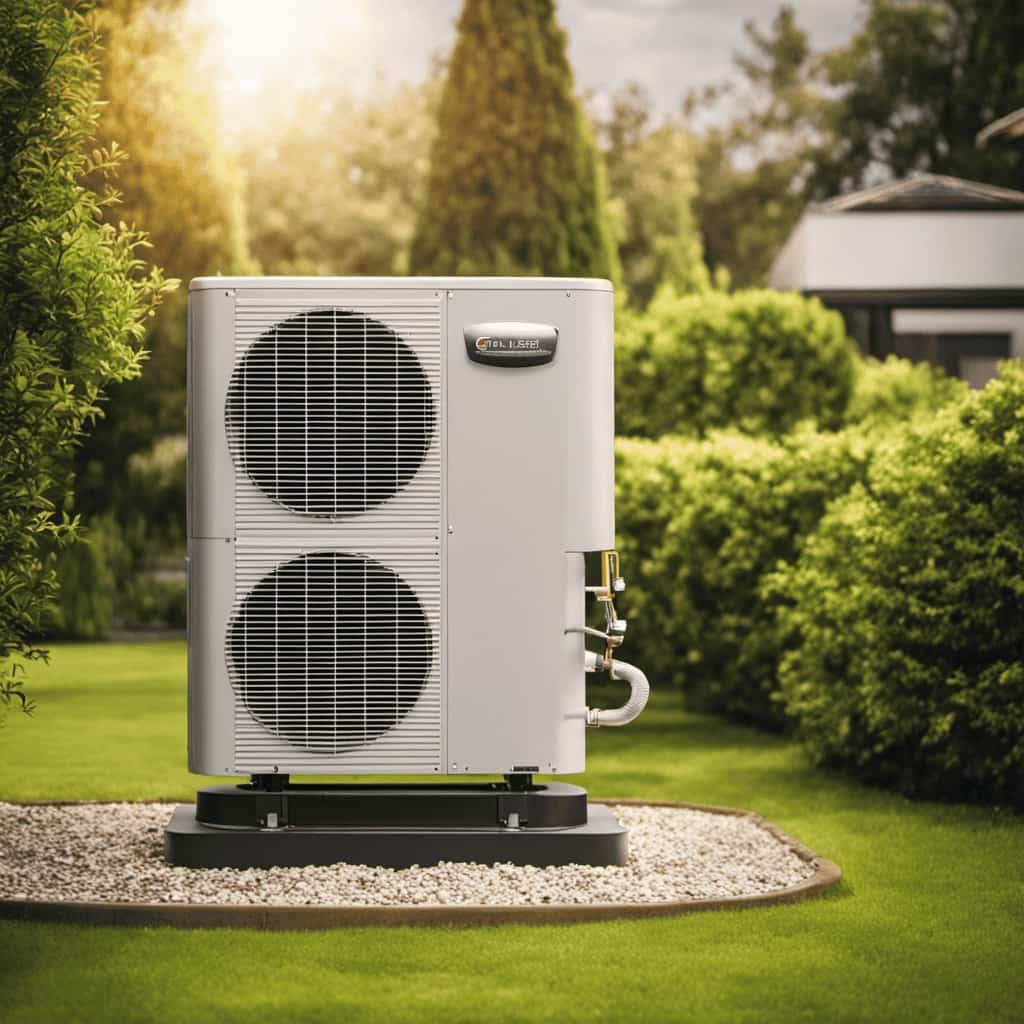
Can the Energy Efficiency Rating of a Heat Pump Change Over Time?
Yes, the energy efficiency rating of a heat pump can change over time due to various factors affecting efficiency. These factors include regular maintenance, age of the equipment, and advancements in technology.
How Can I Determine the Energy Efficiency Rating of My Existing Heat Pump?
To determine the energy efficiency rating of our existing heat pump, we can calculate the efficiency ratio by dividing the output heating or cooling energy by the input electrical energy.
Are There Any Government Incentives or Rebates Available for Purchasing a High-Efficiency Heat Pump?
Yes, there are government incentives and heat pump rebates available for purchasing a high-efficiency heat pump. These incentives and rebates can help reduce the cost and make it more affordable for homeowners to upgrade their heating systems.
Does the Location or Climate Affect the Energy Efficiency Rating of a Heat Pump?
In certain climates, heat pump efficiency ratings can be affected by the location. Additionally, proper installation is crucial for maximizing efficiency. These factors highlight the importance of considering climate and installation when evaluating a heat pump’s energy efficiency.

Conclusion
In conclusion, understanding energy efficiency ratings is crucial when evaluating heat pump options. By decoding SEER and HSPF metrics, consumers can make informed decisions that align with their energy-saving goals.
Comparing ratings and considering tips for maximizing efficiency ensures optimal performance.
Just as a skilled conductor coordinates an orchestra to create a harmonious symphony, homeowners who choose a heat pump with high energy efficiency ratings can enjoy a synchronized blend of comfort and cost savings.
Thermal Energy Transfer
Sustainable Home Design: Heat Pump Systems Efficiency Revealed
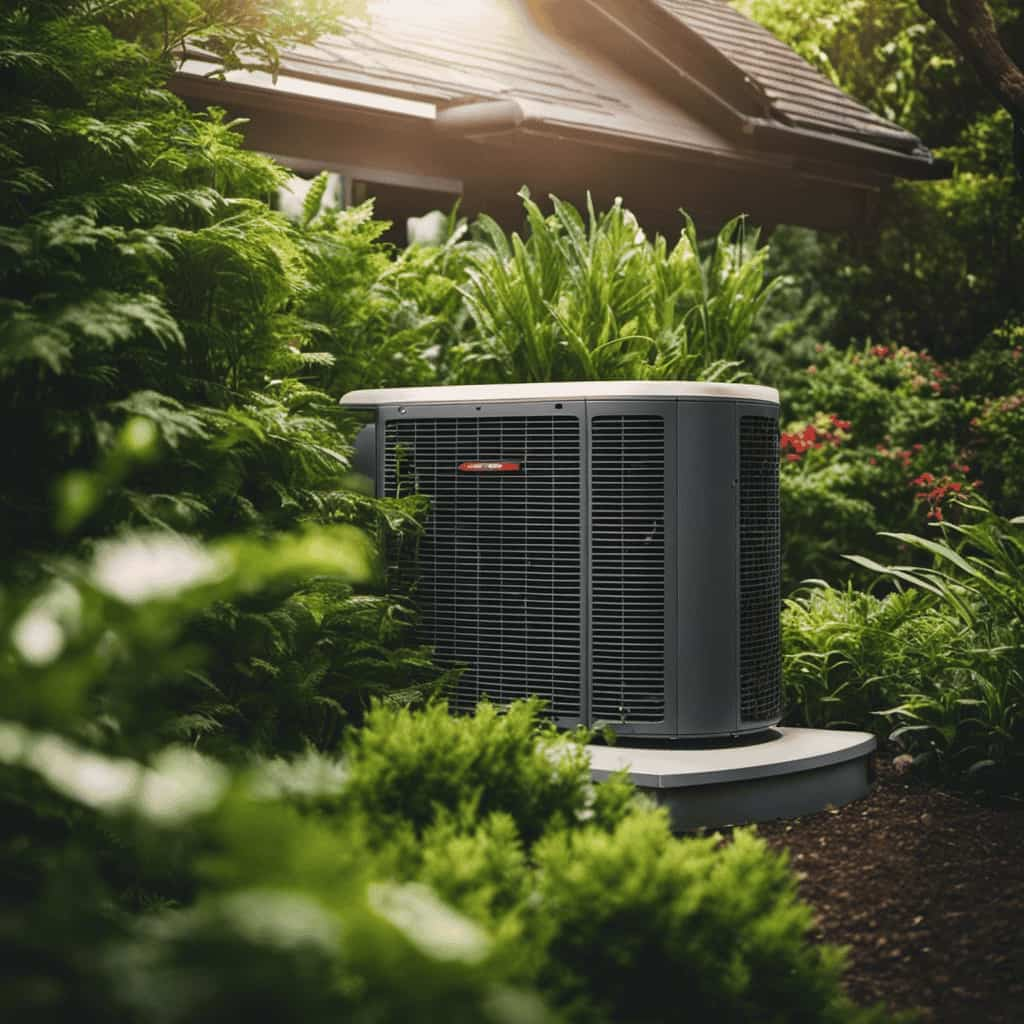
We believed we had a thorough understanding of sustainable home design, but our perspective changed when we learned about the impressive efficiency of heat pump systems.
In this article, we reveal the hidden benefits and secrets of these remarkable systems. From understanding energy efficiency ratings to tips for designing a sustainable home, we’ll guide you through the process of maximizing energy savings.
Prepare to be amazed by the innovations in heat pump technology that can transform your home into an eco-friendly haven.
Let’s dive into the world of heat pump systems and uncover their true potential.

Key Takeaways
- Heat pump systems significantly reduce energy consumption.
- Choosing a system with high SEER and HSPF ratings ensures maximum energy efficiency.
- Proper insulation and optimal system sizing are crucial for efficient heating and cooling.
- Regular maintenance helps maintain optimal system performance and energy efficiency.
The Benefits of Heat Pump Systems in Sustainable Home Design
One of the key benefits of heat pump systems in sustainable home design is that they can significantly reduce energy consumption. This advantage is especially important in today’s world, where energy efficiency is a top priority. By using heat pump systems, homeowners can lower their energy bills and reduce their carbon footprint.
Case studies have shown that these systems can achieve energy savings of up to 50% compared to traditional heating and cooling methods. Additionally, heat pump systems provide both heating and cooling capabilities, eliminating the need for separate systems and saving space.
They also offer precise temperature control and can be easily integrated with renewable energy sources such as solar panels. Overall, heat pump systems are a practical and efficient choice for sustainable home design.
Understanding Energy Efficiency Ratings for Heat Pump Systems
When it comes to understanding energy efficiency ratings for heat pump systems, we need to consider factors such as the Seasonal Energy Efficiency Ratio (SEER) and the Heating Seasonal Performance Factor (HSPF). These ratings are important in evaluating the performance of a heat pump system.

The SEER measures the cooling efficiency of the system during the cooling season, while the HSPF measures the heating efficiency during the heating season. Higher SEER and HSPF ratings indicate greater energy efficiency, which means lower energy consumption and cost savings.
It’s crucial to consider these ratings when choosing a heat pump system for your sustainable home. By opting for a system with high SEER and HSPF ratings, you can ensure maximum energy efficiency and reduce your environmental impact.
In the next section, we’ll discuss tips and considerations for designing a sustainable home with heat pump systems.
Designing a Sustainable Home With Heat Pump Systems: Tips and Considerations
To maximize the energy efficiency of our sustainable home, we should consider various tips and considerations when designing it with heat pump systems. Here are three key factors to keep in mind:

-
Proper insulation: Insulating your home effectively is crucial for reducing heat loss and ensuring that your heat pump system operates efficiently. Insulate walls, floors, and roofs to minimize heat transfer and maintain a comfortable indoor temperature.
-
Optimal system sizing: It’s important to choose the right size heat pump system for your home. Oversized systems can lead to inefficient operation, while undersized systems may struggle to meet your heating and cooling needs. Work with a professional to determine the appropriate size for your specific requirements.
-
Renewable energy integration: Consider integrating renewable energy sources, such as solar panels or wind turbines, with your heat pump system. This allows you to harness clean energy and further reduce your carbon footprint.
Maximizing Energy Savings Through Proper Heat Pump System Sizing
To maximize our energy savings, we need to ensure that our heat pump system is properly sized for our home. A heat pump that is too small will struggle to heat or cool our space efficiently, while a system that is too large will cycle on and off frequently, leading to increased energy consumption and wear and tear on the equipment. Proper heat pump sizing involves considering factors such as the size and layout of our home, insulation levels, and climate conditions. Consulting with a professional during the heat pump installation process is crucial to ensure accurate sizing. Additionally, regular heat pump maintenance, including cleaning filters and checking refrigerant levels, will help maintain optimal system performance and energy efficiency.
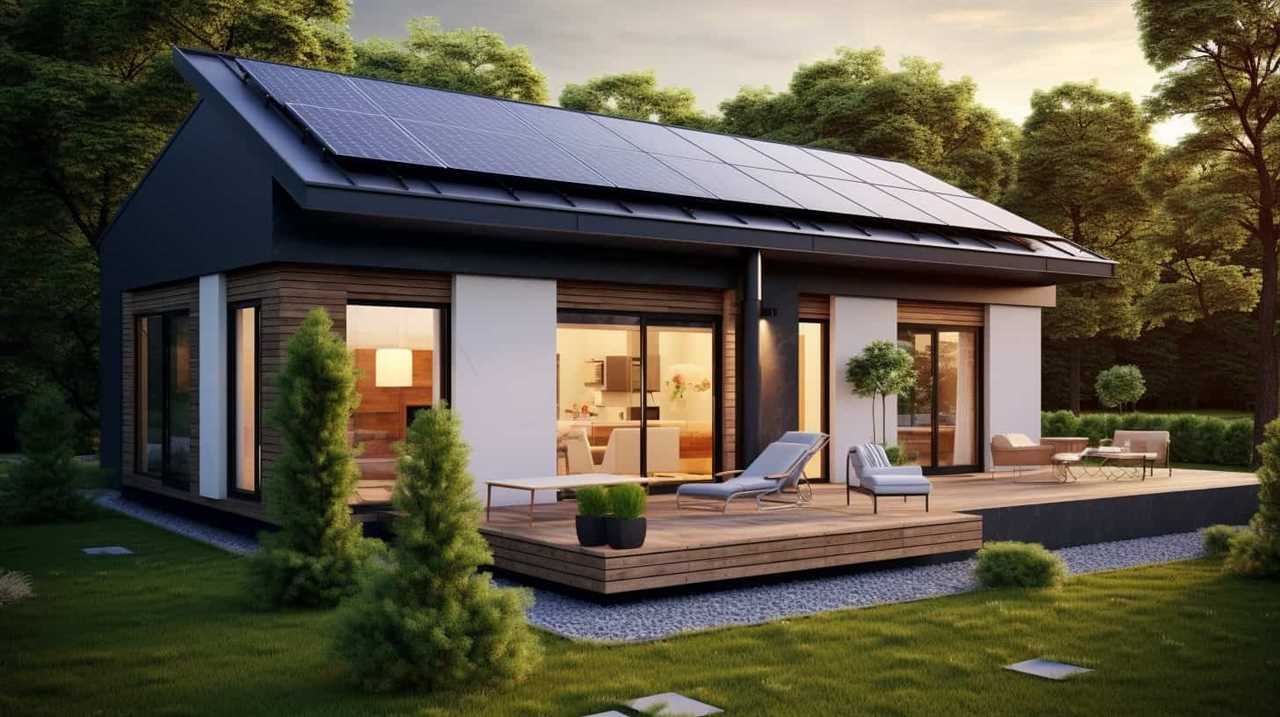
| Factors to Consider for Proper Heat Pump Sizing | |
|---|---|
| Size and layout of our home | Insulation levels |
| Climate conditions | |
| Consultation with a professional during installation | Regular heat pump maintenance |
Innovations in Heat Pump Technology for Sustainable Home Design
We have witnessed remarkable advancements in heat pump technology, revolutionizing sustainable home design. These innovations have brought about significant improvements in the efficiency and performance of heat pump systems, making them an increasingly attractive option for homeowners looking to integrate renewable energy sources into their homes.
Here are three key advancements in heat pump technology:
-
Variable speed compressors: These allow heat pumps to adjust their speed based on the heating or cooling needs of a home, resulting in more precise temperature control and increased energy efficiency.
-
Improved refrigerants: Newer heat pumps use environmentally friendly refrigerants that have a lower impact on the ozone layer and contribute less to global warming.

-
Smart controls and connectivity: Heat pumps now come equipped with smart thermostats and connectivity features, allowing homeowners to remotely control and monitor their systems, optimizing energy usage and reducing costs.
With these advancements, heat pump systems are now a reliable and efficient solution for sustainable home design, offering homeowners the opportunity to reduce their carbon footprint and save on energy bills.
Frequently Asked Questions
Are Heat Pump Systems Suitable for All Types of Homes, or Are There Specific Requirements?
Heat pump systems can be suitable for most homes, but specific requirements, such as adequate insulation and proper sizing, should be met. Consider heat pump system installation costs and the environmental impact when deciding on sustainability.
How Long Do Heat Pump Systems Typically Last Before Needing to Be Replaced?
Heat pump systems typically last around 15-20 years before needing replacement. Factors that affect their lifespan include proper maintenance, usage patterns, and the quality of the system’s components.
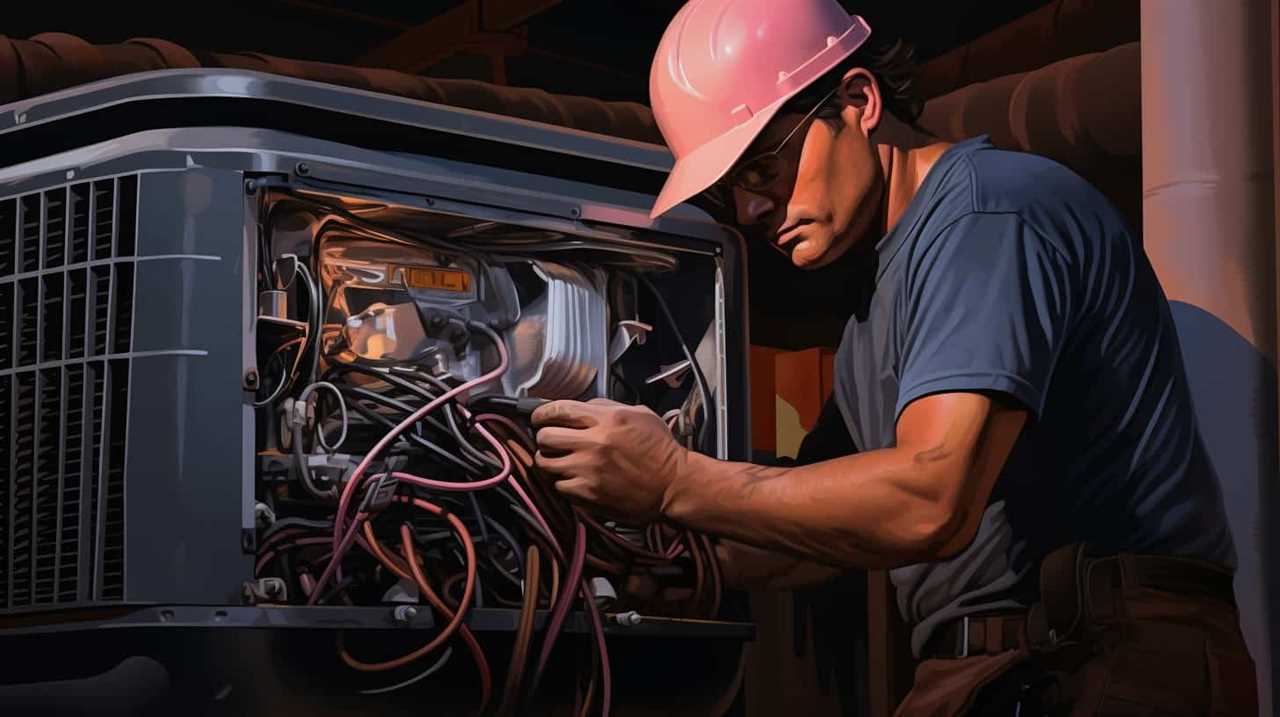
Can Heat Pump Systems Be Used for Both Heating and Cooling Purposes?
Yes, heat pump systems can be used for both heating and cooling purposes. They offer efficient temperature control in our homes. The benefits of using these systems include energy savings and a comfortable living environment.
Are There Any Government Incentives or Rebates Available for Homeowners Who Choose to Install Heat Pump Systems?
Government incentives and rebates are available for homeowners who install heat pump systems. These incentives are designed to encourage energy savings and make sustainable home design more accessible and affordable for everyone.
Are There Any Maintenance Requirements or Costs Associated With Heat Pump Systems?
Maintaining heat pump systems requires regular maintenance to ensure optimal performance. Costs associated with maintenance include filter replacements, annual inspections, and occasional repairs. However, these costs are outweighed by the long-term energy savings and environmental benefits.
Conclusion
In conclusion, heat pump systems are a symbol of efficiency and sustainability in home design.

Their energy efficiency ratings and innovative technology make them a practical choice for those seeking to reduce their environmental impact.
By properly sizing the system and considering tips for sustainable design, homeowners can maximize energy savings and create a comfortable living space.
So, let’s embrace the power of heat pump systems and build a greener future for our homes.
-

 Residential and Commercial Applications2 weeks ago
Residential and Commercial Applications2 weeks agoBest Amana Heat Pump Reviews
-

 Thermal Energy Transfer2 weeks ago
Thermal Energy Transfer2 weeks agoBreakthroughs in Modern Heat Pump Systems: Thermal Energy Edition
-

 Residential and Commercial Applications2 weeks ago
Residential and Commercial Applications2 weeks agoBest Heat Pump
-

 Geothermal Heat Pumps3 months ago
Geothermal Heat Pumps3 months agoUpgrade Your Comfort with Our Efficient HVAC Systems
-

 Air Conditioning3 months ago
Air Conditioning3 months agoExploring Energy-Efficient Air Conditioning Heat Pumps
-

 Geothermal Heat Pumps3 months ago
Geothermal Heat Pumps3 months agoInnovative Geothermal Heat Pump Manufacturers Revolutionize Energy Efficiency
-

 Thermal Energy Transfer1 month ago
Thermal Energy Transfer1 month agoBoost Your Heat Pump Efficiency: Interactive Guide
-

 Residential and Commercial Applications2 weeks ago
Residential and Commercial Applications2 weeks agoBest Portable Heat Pump Heat & AC










